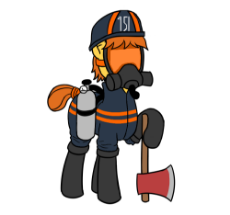Hey Üb, lets read together shall we?
I propose this, we all vote for a book every month and we all read it together then we discuss its contents here, to ensure we are on the same page we should read a certain number of pages every day.
Lets say, a 200 pages book in a 25 days month would make up for 200/25= 8 pages a day. (i know these are really few pages but its just to ensure we can all spare some time to read it)
So, wanna do it? Just post a book below so we can make a strawpool!
To start with something im sure we all are familiar with, i will add Mein Kampf to the list, post any books you would like to go to the strawpool below!
/ub/ - Überhengst
Becoming better
File (): EDE79A0DA652C8FE79E7C28323DB4A59-5539344.png (5.3 MB, 1280x720, 5fb1c79f86daa06993b23fdafdeaf3fe.png)

77 replies and 38 files omitted.
File (): 9B670B5901B4C6AE2EC2AA7066370224-21079.png (20.6 KB, 208x275, 1446764898496.png)

>>621
I would be down! We should Read Fahrenheit 451 and then 1984! They flow RIGHT into each other and warn of the future! Neither of them are SUPER long they are short simple but AMAZING reads!
I would be down! We should Read Fahrenheit 451 and then 1984! They flow RIGHT into each other and warn of the future! Neither of them are SUPER long they are short simple but AMAZING reads!
>mlpol book club
Oh I love this ideas.
My suggestions are the normal dsyutopians (451, 1984, etc.)
One I haven't read yet is "Brave New World"
>>627
Or that one
Should I create a poll?
Oh I love this ideas.
My suggestions are the normal dsyutopians (451, 1984, etc.)
One I haven't read yet is "Brave New World"
>>627
Or that one
Should I create a poll?
Hell yeah! Read them all in a line Fahrenheit 451, 1984 then Animal Farm I would LOVE to read them.
OH at the end we can watch the movies for all 3 since they are also REALLY good movies
For those who are interested in reading outside of this using an audio book/
451
https://www.youtube.com/watch?v=V7Pi9Kr9xYI
1984
https://www.youtube.com/watch?v=Vt7QJB02BVU
Animal Farm
https://www.youtube.com/watch?v=Gl4REOWdJSE
OH at the end we can watch the movies for all 3 since they are also REALLY good movies
For those who are interested in reading outside of this using an audio book/
451
https://www.youtube.com/watch?v=V7Pi9Kr9xYI
1984
https://www.youtube.com/watch?v=Vt7QJB02BVU
Animal Farm
https://www.youtube.com/watch?v=Gl4REOWdJSE
Alright, poll is up
http://www.strawpoll.me/14144250
Also, where would be a good place to get Mein Kampf?
http://www.strawpoll.me/14144250
Also, where would be a good place to get Mein Kampf?
File (): 12B1732D2F4C6382C8C619FF99CDBF72-795937.pdf (777.3 KB, , Animal Farm.pdf)
File (): A4252E344BC114C99ACAE7A011FDABC4-1366706.pdf (1.3 MB, , 1984.pdf)
File (): 8FD9610634D955CA57BCD47D290A9DE4-2549274.pdf (2.4 MB, , Mein Kampf.pdf)
File (): D7501CF6E2DF2759949BC312F58AAA52-10181.jpg (9.9 KB, 153x237, Confederate2.jpg)

If you guys want a fun book to read on your own time "guns of the south" is pretty good. It's about time traveling South Africans who help the Confederates win the civil war by bringing them ak 47s. It a ridiculous concept, but it's well written and I enjoyed it. The author is definitely against racism, as the south Africans are portrayed as the "evil neo Nazis", but it's still a fun read.
File (): 5836F2B5447189884382E32DF7EE70C7-134653.jpg (131.5 KB, 774x1247, 54856865956.jpg)

Anons, don't forget about this book. Honestly, one of the best - he he - guides I've ever read.
Oh wow, i didn't expect you all liking this so much, great!
>>630
Thanks anon!
Well we might just start voting now, we are 6 as of now it appears, lets see if there is any other anons wanting to join us.
>>630
Thanks anon!
Well we might just start voting now, we are 6 as of now it appears, lets see if there is any other anons wanting to join us.
I vote Infinite Jest
>>625
I want Anons to read Fahrenheit 451, for the lessons in the book, and so that they could get the backstory for the Evil, Inverted Fireaxe.
I want Anons to read Fahrenheit 451, for the lessons in the book, and so that they could get the backstory for the Evil, Inverted Fireaxe.
>>642
Great book, wouldn't mind reading again. I say the 48 because it details how to proceed and develop one's self as scrupulously (or unscrupulously) as is possible in a world that filled with the unscrupulous. Its like Machiavelli on steroids.
Great book, wouldn't mind reading again. I say the 48 because it details how to proceed and develop one's self as scrupulously (or unscrupulously) as is possible in a world that filled with the unscrupulous. Its like Machiavelli on steroids.
>>642
Weird, I dont remember a lot of the required reading I had back in middle/high school but I do remember Fahrenheit 451 being one of them. Sad if its not anymore.
Weird, I dont remember a lot of the required reading I had back in middle/high school but I do remember Fahrenheit 451 being one of them. Sad if its not anymore.
>>644
>I dont remember a lot of the required reading I had back in middle/high school but I do remember Fahrenheit 451
Ikr. Good book.
>I dont remember a lot of the required reading I had back in middle/high school but I do remember Fahrenheit 451
Ikr. Good book.
>>635
I guess we could close the poll cause there haven't been any new votes recently.
So I guess Fahrenheit 451 wins.
I guess we could close the poll cause there haven't been any new votes recently.
So I guess Fahrenheit 451 wins.
>>667
I recommend we all use the same revision so the pages line up. We should use this one.
https://www.svsd410.org/cms/lib/WA01919490/Centricity/Domain/536/451-entire%20book.pdf
I recommend we all use the same revision so the pages line up. We should use this one.
https://www.svsd410.org/cms/lib/WA01919490/Centricity/Domain/536/451-entire%20book.pdf
Hey Anon if you want I can delete this thread so you can make a thread about the book and have the PDF posted in the main post.
>>675
Just make a second thread, so the data in this one isn't lost. It's not like the catalog is in danger of being slid
Just make a second thread, so the data in this one isn't lost. It's not like the catalog is in danger of being slid
Can we read together "How to Bomb the U.S. Government" by infamous terrorist Sam Hyde?
https://www.vapes.com/products/mde-presents-how-to-bomb-the-u-s-govt-preorder?variant=27318916417
https://www.vapes.com/products/mde-presents-how-to-bomb-the-u-s-govt-preorder?variant=27318916417
Holy shit, that's a cute Pinkie model. So much cuter than those ugly sfm models.
Man, this seriously didn't got off the ground, maybe we need to check on this board every once in a while..
File (): 200145766C244423AA3AF0148F1E28F8-1941192.jpg (1.9 MB, 2334x3474, William_Luther_Pierce.jpg)
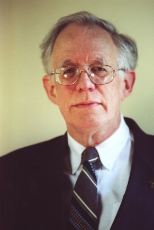
Who's up for some alternate history!
https://www.e-reading.club/bookreader.php/133469/The_Turner_Diaries.pdf
https://www.e-reading.club/bookreader.php/133469/The_Turner_Diaries.pdf
>>621
Yo, i say we make a livestream of audiobooks, 1 or 2h per week so anons can do whatever while listening to the stream.
Yo, i say we make a livestream of audiobooks, 1 or 2h per week so anons can do whatever while listening to the stream.
>>1309
I'll second this. Should we gather via a site like rabb.it?
Also wake up thread! I got a library on my external drive and I wanna read shit with you faggots when February comes. Maybe we can do a poll when my computer works again?
I'll second this. Should we gather via a site like rabb.it?
Also wake up thread! I got a library on my external drive and I wanna read shit with you faggots when February comes. Maybe we can do a poll when my computer works again?
File (): 020106E970CA85F2B19DAD2111CF23F6-849996.pdf (830.1 KB, , 1285134779158_htwfaip.pdf)
File (): E93780883A08B13389888E4F3AC44D93-3898982.pdf (3.7 MB, , 1513051715166.pdf)
File (): A56A3AFED5FC24A7C3F8FD816E24CC8F-497206.pdf (485.6 KB, , 1524436246090.pdf)
File (): 1FDEC6E6C8D85D5172223615BEC94D47-2738093.pdf (2.6 MB, , 1547796428748-0.pdf)
File (): 3E51907B7EAB3AD99E9FD4F1FE2F70DD-32083684.pdf (30.6 MB, , Aristotle_-_Politics.pdf)
File (): 5A9CD377764D16499F1EB555BF032365-185600.pdf (181.3 KB, , BASICECONOMICS.pdf)
File (): AECC8A1FA673C74C161C019D35B6D3E6-10469889.pdf (10.0 MB, , Grand_Chessboard.pdf)
File (): CA26DBB347BDF9F69923450DEC328A05-469431.pdf (458.4 KB, , Nations by Consent.pdf)
File (): 3A017576869ED3D619B3A957DD26465A-507280.pdf (495.4 KB, , prince.pdf)
File (): C761EF7FACEC8533F0E71DAED7A5632F-2915068.pdf (2.8 MB, , What Has Government Done to Our Money_3.pdf)
That should keep you busy there is other stuff but more specific.
>>1658
I like this idea. I doubt every book posted here will be read but we'll at least finish Mein Kampf. But can a thread this old even be revived?
I like this idea. I doubt every book posted here will be read but we'll at least finish Mein Kampf. But can a thread this old even be revived?
File (): A9436067F1DF595138BDE878A5DAF176-2516996.pdf (2.4 MB, , meinkampf.pdf)
>>1661
Yeah, its on front page right now
Its just lacking some organization, getting a bunch of anons to actually participate.
Heres mein Kampf (557 pages)
If we read 9 per day we can finish it in two months
Yeah, its on front page right now
Its just lacking some organization, getting a bunch of anons to actually participate.
Heres mein Kampf (557 pages)
If we read 9 per day we can finish it in two months
File (): 5BFCD01D6015CD82D0C201C8C9916809-203309.png (198.5 KB, 1260x1024, reading-transparent-background-2.png)

File (): 11C9C03401331A16FAA6E83F2FF0109E-127418.jpg (124.4 KB, 1021x1024, 1563818040987m.jpg)

>>1664
Sorry, i ran out of internets
>Wut
So, Ill start the reading this weekend, 9 pages/day and post a few important quotes here, whoever anon wants to join, just download the pdf!
Sorry, i ran out of internets
>Wut
So, Ill start the reading this weekend, 9 pages/day and post a few important quotes here, whoever anon wants to join, just download the pdf!
File (): 20D7353394FC37010E187F2772CC36C5-1445729.gif (1.4 MB, 550x431, shieeeeeeeeet.gif)
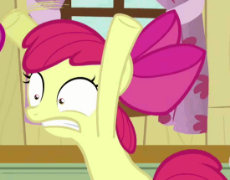
>>1681
Shit, i forgot to post
>I know that fewer people are won over by the written word than by the spoken word and that every great movement on this earth owes its growth to great speakers and not to great writers.
Hitler on the preface of the book, he's making an interesting point here about how more than a book, a movement needs something to actually read that words in order to inspire others.
>Chapter 1
>People of the same blood should be in the same REICH.(...)
When the territory of the REICH embraces all the Germans and finds itself unable to assure them a livelihood, only then can the moral right arise, from the need of the people to acquire foreign territory.
>The plough is then the sword; and the tears of war will produce the daily bread for the generations to come.
This is too juicy to not add here, next he goes on to talk about the life of his father until...
>I gave scarcely
any serious thought to the question of choosing a vocation in life; but I was certainly quite out of sympathy with the kind of career which my father had followed. I think that an inborn talent for speaking now began to develop and take shape during the more or less strenuous arguments which I used to have with my comrades.
Relatable.
>For the first time in my life--I was then eleven years old--I felt myself forced into open opposition. No matter how hard and determined my father might be about putting his own plans and opinions into action, his son was no less obstinate in refusing to accept ideas on which he set little or no value
>No amount of persuasion and no amount of 'grave' warnings could break down that opposition. I would not become a State official, not on any account.
...
>But the situation became more difficult once I had a positive plan of my own which I might present to my father as a counter-suggestion. This happened when I was twelve years old. How it came about I cannot exactly say now; but one day it became clear to me that I would be a painter--I mean an artist.
Oh boy
>The old Austria was a multi-national State.
>The Germans of the REICH did not realize that if the Germans in Austria had not been of the best racial stock they could never have given the stamp of their own character to an Empire of 52 millions, so definitely that in Germany itself the idea arose--though quite an erroneous one--that Austria was a German State.
>That was an error which led to dire consequences
>Only very few of the Germans in the REICH itself had an idea of the bitter struggle which those Eastern Germans had to carry on daily for the preservation of their German language, their German schools and their German character.
The language fight, also history repeating itself
>What has happened always and everywhere (...) happened also in the language fight which was carried on in the old Austria.
>There were three groups--the fighters, the hedgers and the traitors. Even in the schools this sifting already began to take place
>Under many forms the young people led the struggle, fighting in their own way and with their own weapons. They refused to sing non-German songs.
>They were incredibly alert in the significance of what the non-German teachers said and they contradicted in unison. They wore the forbidden emblems of their own kinsfolk and were happy when penalised for doing so, or even physically punished. In miniature they were mirrors of loyalty from which the older people might learn a lesson.
>We greeted one another with HEIL! and instead of the Austrian anthem we sang our own DEUTSCHLAND ÜBER ALLES, despite warnings and penalties.
Important
>To study history means to search for and discover the forces that are the causes of those results which appear before our eyes as historical events. The art of reading and studying consists in remembering the essentials and forgetting what is not essential.
>What history taught us about the policy followed by the House of Habsburg was corroborated by our own everyday experiences. In the north and in the south the poison of foreign races was eating into the body of our people, and even Vienna was steadily becoming more and more a non-German city. The 'Imperial House' favoured the Czechs on every possible occasion. Indeed it was the hand of the goddess of eternal justice and inexorable retribution that caused the most deadly enemy of Germanism in Austria, the Archduke Franz Ferdinand, to fall by the very bullets which he himself had helped to cast. Working from above downwards, he was the chief patron of the movement to make Austria a Slav State.
Quotes for now, i'll post some more in a few minutes, this is a great book. i totally didn't forget the thread
Shit, i forgot to post
>I know that fewer people are won over by the written word than by the spoken word and that every great movement on this earth owes its growth to great speakers and not to great writers.
Hitler on the preface of the book, he's making an interesting point here about how more than a book, a movement needs something to actually read that words in order to inspire others.
>Chapter 1
>People of the same blood should be in the same REICH.(...)
When the territory of the REICH embraces all the Germans and finds itself unable to assure them a livelihood, only then can the moral right arise, from the need of the people to acquire foreign territory.
>The plough is then the sword; and the tears of war will produce the daily bread for the generations to come.
This is too juicy to not add here, next he goes on to talk about the life of his father until...
>I gave scarcely
any serious thought to the question of choosing a vocation in life; but I was certainly quite out of sympathy with the kind of career which my father had followed. I think that an inborn talent for speaking now began to develop and take shape during the more or less strenuous arguments which I used to have with my comrades.
Relatable.
>For the first time in my life--I was then eleven years old--I felt myself forced into open opposition. No matter how hard and determined my father might be about putting his own plans and opinions into action, his son was no less obstinate in refusing to accept ideas on which he set little or no value
>No amount of persuasion and no amount of 'grave' warnings could break down that opposition. I would not become a State official, not on any account.
...
>But the situation became more difficult once I had a positive plan of my own which I might present to my father as a counter-suggestion. This happened when I was twelve years old. How it came about I cannot exactly say now; but one day it became clear to me that I would be a painter--I mean an artist.
Oh boy
>The old Austria was a multi-national State.
>The Germans of the REICH did not realize that if the Germans in Austria had not been of the best racial stock they could never have given the stamp of their own character to an Empire of 52 millions, so definitely that in Germany itself the idea arose--though quite an erroneous one--that Austria was a German State.
>That was an error which led to dire consequences
>Only very few of the Germans in the REICH itself had an idea of the bitter struggle which those Eastern Germans had to carry on daily for the preservation of their German language, their German schools and their German character.
The language fight, also history repeating itself
>What has happened always and everywhere (...) happened also in the language fight which was carried on in the old Austria.
>There were three groups--the fighters, the hedgers and the traitors. Even in the schools this sifting already began to take place
>Under many forms the young people led the struggle, fighting in their own way and with their own weapons. They refused to sing non-German songs.
>They were incredibly alert in the significance of what the non-German teachers said and they contradicted in unison. They wore the forbidden emblems of their own kinsfolk and were happy when penalised for doing so, or even physically punished. In miniature they were mirrors of loyalty from which the older people might learn a lesson.
>We greeted one another with HEIL! and instead of the Austrian anthem we sang our own DEUTSCHLAND ÜBER ALLES, despite warnings and penalties.
Important
>To study history means to search for and discover the forces that are the causes of those results which appear before our eyes as historical events. The art of reading and studying consists in remembering the essentials and forgetting what is not essential.
>What history taught us about the policy followed by the House of Habsburg was corroborated by our own everyday experiences. In the north and in the south the poison of foreign races was eating into the body of our people, and even Vienna was steadily becoming more and more a non-German city. The 'Imperial House' favoured the Czechs on every possible occasion. Indeed it was the hand of the goddess of eternal justice and inexorable retribution that caused the most deadly enemy of Germanism in Austria, the Archduke Franz Ferdinand, to fall by the very bullets which he himself had helped to cast. Working from above downwards, he was the chief patron of the movement to make Austria a Slav State.
Quotes for now, i'll post some more in a few minutes, this is a great book. i totally didn't forget the thread
File (): 6D37D3F2AE48DB46BF1435CFE807ADDC-115407.png (112.7 KB, 371x528, medium (1).png)
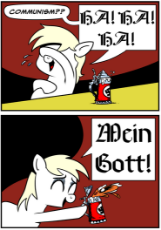
>>1683
Page 20 to 30; I wanted to become a painter edition
>When I was in my thirteenth year my father was suddenly taken from us. He was still in robust health when a stroke of apoplexy painlessly ended his earthly wanderings and left us all deeply bereaved.
Rip hitler's father.
>Illness suddenly came to my assistance.
>y lungs became so seriously affected that the doctor advised my mother very strongly not under any circumstances to allow me to take up a career which would necessitate working in an office
>What I had secretly desired for such a long time, and had persistently fought for, now became a reality almost at one stroke.
The plot tickens.
>Two years later my mother's death put a brutal end to all my fine projects.
> Though expected, her death came as a terrible blow to me. I respected my father, but I loved my mother.
He lost his father at 13 and his mother at 15, well shit
>The allowance which came to me as an orphan was not enough for the bare necessities of life. Somehow or other I would have to earn my own bread.
>With my clothes and linen packed in a valise and with an indomitable resolution in my heart, I left for Vienna.
>I was determined to become 'something'--but certainly not a civil servant.
End of Chapter 1 and starting Chapter 2
>WHEN MY mother died my fate had already been decided in one respect. During the last months of her illness I went to Vienna to take the entrance examination for the Academy of Fine Arts. Armed with a bulky packet of sketches, I felt convinced that I should pass the examination quite easily. At the REALSCHULE I was by far the best student in the drawing class, and since that time I had made more than ordinary progress in the practice of drawing.
>I was so convinced of my success that when the news that I had failed to pass was brought to me it struck me like a bolt from the skies.
It begins
>He said that the sketches which I had brought with me unquestionably showed that painting was not what I was suited for but that the same sketches gave clear indications of my aptitude for architectural designing.
>herefore the School of Painting did not come into question for me but rather the School of Architecture.
And now
>Within a few days I myself also knew that I ought to become an architect. But of course the way was very difficult. I was now forced bitterly to rue my former conduct in neglecting and despising certain subjects at the REALSCHULE. Before taking up the courses at the School of Architecture in the Academy it was necessary to attend the Technical Building School; but a necessary qualification for entrance into this school was a Leaving Certificate from the Middle School. And this I simply did not have.
As if it was written in 2019.
>After the death of my mother I came to Vienna for the third time. This visit was destined to last several years.
>I had my eyes steadily fixed on the goal. I would be an architect.
>Obstacles are placed across our path in life, not to be boggled at but to be surmounted.
>I am thankful for that period of my life, because it hardened me and enabled me to be as tough as I now am. And I am even more thankful because I appreciate the fact that I was thus saved from the emptiness of a life of ease and that a mother's darling was taken from tender arms and handed over to Adversity as to a new mother. Though I then rebelled against it as too hard a fate, I am grateful that I was thrown into a world of misery and poverty and thus came to know the people for whom I was afterwards to fight.
>Five years of poverty in that Phaecian town. Five years in which, first as a casual labourer and then as a painter of little trifles, I had to earn my daily bread.
>Every book that I bought meant renewed hunger(...)
>And yet during that time I learned more than I had ever learned before.
>I read a great deal then, and I pondered deeply over what I read. All the free time after work was devoted exclusively to study. Thus within a few years I was able to acquire a stock of knowledge which I find useful even to-day.
The demon days and..
>There was hardly any other German city in which the social problem could be studied better than in Vienna.
>Thousands of unemployed loitered in front of the palaces on the Ring Strasse; and below that VIA TRIUMPHALIS of the old Austria the homeless huddled together in the murk and filth of the canals.
>The man who has never been in the clutches of that crushing viper can never know what its poison is. An attempt to study it in any other way will result only in superficial talk and sentimental delusions.Both are harmful. The first because it can never go to the root of the question, the second because it evades the question entirely.
Really relevant right here.
> I was protected against the temptation to study the social question in the way just mentioned, for the simple reason that I was forced to live in the midst of poverty-stricken people.
Then he goes on talking on
>The country lad who migrates to the big city feels attracted by what has been described as easy work
And how said country lad gets inside a vicious cycle of repetition, spiralling down the social ladder to become yet another poor souless worker, culminating in
>He has been so often thrown out of employment through no fault of his own that he is now more or less indifferent whether the strike in which he takes part be for the
purpose of securing his economic rights or be aimed at the destruction of the State, the whole social order and even civilization itself. Though the idea of going on strike may not be to his natural liking, yet he joins in it out of sheer indifference.
And that will be it for today, tomorrow i'll post quotes from the next 9 pages and maybe some comments to catch your attention span.
Book is attached here for whoever wants to read along >>1662
Page 20 to 30; I wanted to become a painter edition
>When I was in my thirteenth year my father was suddenly taken from us. He was still in robust health when a stroke of apoplexy painlessly ended his earthly wanderings and left us all deeply bereaved.
Rip hitler's father.
>Illness suddenly came to my assistance.
>y lungs became so seriously affected that the doctor advised my mother very strongly not under any circumstances to allow me to take up a career which would necessitate working in an office
>What I had secretly desired for such a long time, and had persistently fought for, now became a reality almost at one stroke.
The plot tickens.
>Two years later my mother's death put a brutal end to all my fine projects.
> Though expected, her death came as a terrible blow to me. I respected my father, but I loved my mother.
He lost his father at 13 and his mother at 15, well shit
>The allowance which came to me as an orphan was not enough for the bare necessities of life. Somehow or other I would have to earn my own bread.
>With my clothes and linen packed in a valise and with an indomitable resolution in my heart, I left for Vienna.
>I was determined to become 'something'--but certainly not a civil servant.
End of Chapter 1 and starting Chapter 2
>WHEN MY mother died my fate had already been decided in one respect. During the last months of her illness I went to Vienna to take the entrance examination for the Academy of Fine Arts. Armed with a bulky packet of sketches, I felt convinced that I should pass the examination quite easily. At the REALSCHULE I was by far the best student in the drawing class, and since that time I had made more than ordinary progress in the practice of drawing.
>I was so convinced of my success that when the news that I had failed to pass was brought to me it struck me like a bolt from the skies.
It begins
>He said that the sketches which I had brought with me unquestionably showed that painting was not what I was suited for but that the same sketches gave clear indications of my aptitude for architectural designing.
>herefore the School of Painting did not come into question for me but rather the School of Architecture.
And now
>Within a few days I myself also knew that I ought to become an architect. But of course the way was very difficult. I was now forced bitterly to rue my former conduct in neglecting and despising certain subjects at the REALSCHULE. Before taking up the courses at the School of Architecture in the Academy it was necessary to attend the Technical Building School; but a necessary qualification for entrance into this school was a Leaving Certificate from the Middle School. And this I simply did not have.
As if it was written in 2019.
>After the death of my mother I came to Vienna for the third time. This visit was destined to last several years.
>I had my eyes steadily fixed on the goal. I would be an architect.
>Obstacles are placed across our path in life, not to be boggled at but to be surmounted.
>I am thankful for that period of my life, because it hardened me and enabled me to be as tough as I now am. And I am even more thankful because I appreciate the fact that I was thus saved from the emptiness of a life of ease and that a mother's darling was taken from tender arms and handed over to Adversity as to a new mother. Though I then rebelled against it as too hard a fate, I am grateful that I was thrown into a world of misery and poverty and thus came to know the people for whom I was afterwards to fight.
>Five years of poverty in that Phaecian town. Five years in which, first as a casual labourer and then as a painter of little trifles, I had to earn my daily bread.
>Every book that I bought meant renewed hunger(...)
>And yet during that time I learned more than I had ever learned before.
>I read a great deal then, and I pondered deeply over what I read. All the free time after work was devoted exclusively to study. Thus within a few years I was able to acquire a stock of knowledge which I find useful even to-day.
The demon days and..
>There was hardly any other German city in which the social problem could be studied better than in Vienna.
>Thousands of unemployed loitered in front of the palaces on the Ring Strasse; and below that VIA TRIUMPHALIS of the old Austria the homeless huddled together in the murk and filth of the canals.
>The man who has never been in the clutches of that crushing viper can never know what its poison is. An attempt to study it in any other way will result only in superficial talk and sentimental delusions.Both are harmful. The first because it can never go to the root of the question, the second because it evades the question entirely.
Really relevant right here.
> I was protected against the temptation to study the social question in the way just mentioned, for the simple reason that I was forced to live in the midst of poverty-stricken people.
Then he goes on talking on
>The country lad who migrates to the big city feels attracted by what has been described as easy work
And how said country lad gets inside a vicious cycle of repetition, spiralling down the social ladder to become yet another poor souless worker, culminating in
>He has been so often thrown out of employment through no fault of his own that he is now more or less indifferent whether the strike in which he takes part be for the
purpose of securing his economic rights or be aimed at the destruction of the State, the whole social order and even civilization itself. Though the idea of going on strike may not be to his natural liking, yet he joins in it out of sheer indifference.
And that will be it for today, tomorrow i'll post quotes from the next 9 pages and maybe some comments to catch your attention span.
Book is attached here for whoever wants to read along >>1662
Welcome guys to episode 2 of this great adventure called reading mein kampf; Exemplified edition.
Is anyone else reading this right now? We will go from page 30 to 40 today.
*ahem*
>One thing stood out clearly before my eyes: It was the sudden changes from work to idleness and vice versa; so that the constant fluctuations thus caused by earnings and expenditure finally destroyed the 'sense of thrift for many people and also the habit of regulating expenditure in an intelligent way.
In this whole paragraph hitler proceeds to explain how periods of work mixed with periods of hunger has an impact on the worker's psychology, affecting mostly the worker's hability to spend money cautiously:
> the deprivations which the unemployed worker has to endure must be compensated for psychologically by a persistent mental mirage in which he imagines himself eating heartily once again.
>This leads to confusion in the little weekly housekeeping budget, because the expenditure is not rationally planned.
>(...)the earnings will last perhaps for five days instead of seven(...)as the habit recurs, the earnings will last scarcely for a day; and finally they will disappear in one night of feasting.
He proceeds to set an example in which the worker has a family, how such lifestyle conditions children to live in such a way, thus repeating the cycle.
>I have had actual experience of all this in hundreds of cases. At first I was disgusted and indignant; but later on I came to recognize the whole tragedy of their misfortune and to understand the profound causes of it. They were the unhappy victims of evil circumstances.
>those who emerged from all this misfortune and misery, from this filth and outward degradation, were not human beings as such but rather lamentable results of lamentable laws.
And now we start with a little bit of ideology; A solution:
>Even in those days I already saw that there was a two-fold method by which alone it would be possible to bring about an amelioration of these conditions:
>first, to create better fundamental conditions of social development by establishing a profound feeling for social responsibilities among the public; second, to combine this feeling for social responsibilities with a ruthless determination to prune away all excrescences which are incapable of being improved.
>Just as Nature concentrates its greatest attention, not to the maintenance of what already exists but on the selective breeding of offspring in order to carry on the species, so in human life also it is less a matter of artificially improving the existing generation--which, owing to human characteristics, is impossible in ninety-nine cases out of a hundred--and more a matter of securing from the very start a better road for future development.
>he aim of all social activity must never be merely charitable relief, which is ridiculous and useless, but it must rather be a means to find a way of eliminating the fundamental deficiencies in our economic and cultural life
Then he talks in lenght about the burgeois hipocricy, specially when judging a young man that is, in his words, a victim of circunstances (I reccomend checking the whole text out but it's too much to put here so here's the end statement)
>Day after day the bourgeois world are witnesses to the phenomenon of spreading poison among the people through the instrumentality of the theatre and the cinema, gutter journalism and obscene books; and yet they are astonished at the deplorable 'moral standards' and 'national indifference' of the masses. As if the cinema bilge and the gutter press and suchlike could inculcate knowledge of the greatness of one's country, apart entirely from the earlier education of the individual.
On nationalism:
>I can fight only for something that I love. I can love only what I respect. And in order to respect a thing I must at least have some knowledge of it.
On his daily life
>Besides my interest in the social question I naturally devoted myself with enthusiasm to the study of architecture. Side by side with music, I considered it queen of the arts. To study it was for me not work but pleasure. I could read or draw until the small hours of the morning without ever getting tired. And I became more and more confident that my dream of a brilliant future would become true, even though I should have to wait long years for its fulfilment. I was firmly convinced that one day I should make a name for myself as an architect.
At this time, he was making money by working as a painter and a draughtsman
>I looked upon this practical interest in politics merely as part of an elementary obligation that devolves on every thinking man.
Every /pol/ack ever
>Those who have no understanding of the political world around them have no right to criticize or complain.
>Reading is not an end in itself, but a means to an end. Its chief purpose is to help towards filling in the framework which is made up of the talents and capabilities that each individual possesses.
I feel like i'm dissecting a philosophy book at this point (beyond good and evil, anyone?)
>I know people who read interminably, book after book, from page to page, and yet I should not call them 'well-read people'.
>They have not the faculty of distinguishing between what is useful and useless in a book(...)
>Each little piece of knowledge thus gained must be treated as if it were a little stone to be inserted into a mosaic, so that it finds its proper place among all the other pieces and particles that help to form a general world-picture in the brain of the reader.
>Otherwise only a confused jumble of chaotic notions will result from all this reading.
I'll follow up with another post, running out of characters here.
Is anyone else reading this right now? We will go from page 30 to 40 today.
*ahem*
>One thing stood out clearly before my eyes: It was the sudden changes from work to idleness and vice versa; so that the constant fluctuations thus caused by earnings and expenditure finally destroyed the 'sense of thrift for many people and also the habit of regulating expenditure in an intelligent way.
In this whole paragraph hitler proceeds to explain how periods of work mixed with periods of hunger has an impact on the worker's psychology, affecting mostly the worker's hability to spend money cautiously:
> the deprivations which the unemployed worker has to endure must be compensated for psychologically by a persistent mental mirage in which he imagines himself eating heartily once again.
>This leads to confusion in the little weekly housekeeping budget, because the expenditure is not rationally planned.
>(...)the earnings will last perhaps for five days instead of seven(...)as the habit recurs, the earnings will last scarcely for a day; and finally they will disappear in one night of feasting.
He proceeds to set an example in which the worker has a family, how such lifestyle conditions children to live in such a way, thus repeating the cycle.
>I have had actual experience of all this in hundreds of cases. At first I was disgusted and indignant; but later on I came to recognize the whole tragedy of their misfortune and to understand the profound causes of it. They were the unhappy victims of evil circumstances.
>those who emerged from all this misfortune and misery, from this filth and outward degradation, were not human beings as such but rather lamentable results of lamentable laws.
And now we start with a little bit of ideology; A solution:
>Even in those days I already saw that there was a two-fold method by which alone it would be possible to bring about an amelioration of these conditions:
>first, to create better fundamental conditions of social development by establishing a profound feeling for social responsibilities among the public; second, to combine this feeling for social responsibilities with a ruthless determination to prune away all excrescences which are incapable of being improved.
>Just as Nature concentrates its greatest attention, not to the maintenance of what already exists but on the selective breeding of offspring in order to carry on the species, so in human life also it is less a matter of artificially improving the existing generation--which, owing to human characteristics, is impossible in ninety-nine cases out of a hundred--and more a matter of securing from the very start a better road for future development.
>he aim of all social activity must never be merely charitable relief, which is ridiculous and useless, but it must rather be a means to find a way of eliminating the fundamental deficiencies in our economic and cultural life
Then he talks in lenght about the burgeois hipocricy, specially when judging a young man that is, in his words, a victim of circunstances (I reccomend checking the whole text out but it's too much to put here so here's the end statement)
>Day after day the bourgeois world are witnesses to the phenomenon of spreading poison among the people through the instrumentality of the theatre and the cinema, gutter journalism and obscene books; and yet they are astonished at the deplorable 'moral standards' and 'national indifference' of the masses. As if the cinema bilge and the gutter press and suchlike could inculcate knowledge of the greatness of one's country, apart entirely from the earlier education of the individual.
On nationalism:
>I can fight only for something that I love. I can love only what I respect. And in order to respect a thing I must at least have some knowledge of it.
On his daily life
>Besides my interest in the social question I naturally devoted myself with enthusiasm to the study of architecture. Side by side with music, I considered it queen of the arts. To study it was for me not work but pleasure. I could read or draw until the small hours of the morning without ever getting tired. And I became more and more confident that my dream of a brilliant future would become true, even though I should have to wait long years for its fulfilment. I was firmly convinced that one day I should make a name for myself as an architect.
At this time, he was making money by working as a painter and a draughtsman
>I looked upon this practical interest in politics merely as part of an elementary obligation that devolves on every thinking man.
Every /pol/ack ever
>Those who have no understanding of the political world around them have no right to criticize or complain.
>Reading is not an end in itself, but a means to an end. Its chief purpose is to help towards filling in the framework which is made up of the talents and capabilities that each individual possesses.
I feel like i'm dissecting a philosophy book at this point (beyond good and evil, anyone?)
>I know people who read interminably, book after book, from page to page, and yet I should not call them 'well-read people'.
>They have not the faculty of distinguishing between what is useful and useless in a book(...)
>Each little piece of knowledge thus gained must be treated as if it were a little stone to be inserted into a mosaic, so that it finds its proper place among all the other pieces and particles that help to form a general world-picture in the brain of the reader.
>Otherwise only a confused jumble of chaotic notions will result from all this reading.
I'll follow up with another post, running out of characters here.
>>1688
Let's talk gommunism
>It is impossible to say when I might have started to make a thorough study of the doctrine and characteristics of Marxism were it not for the fact that I then literally ran head foremost into the problem.
>What I knew of Social Democracy in my youth was precious little and that little was for the most part wrong.
>All of a sudden I was brought face to face with the products of their teaching and what they called their WELTANSCHAUUNG. In this way a few months sufficed for me to learn something which under other circumstances might have necessitated decades of study--namely, that under the cloak of social virtue and love of one's neighbour a veritable pestilence was spreading abroad and that if this pestilence be not stamped out of the world without delay it may eventually succeed in exterminating the human race.
>I first came into contact with the Social Democrats while working in the building trade.
>At midday some of my fellow workers used to adjourn to the nearest tavern, while the others remained on the building premises and there ate their midday meal
>They now talked politics.
>I drank my bottle of milk and ate my morsel of bread somewhere on the outskirts
>And I often thought that some of what they said was meant for my ears
>But all that I heard had the effect of arousing the strongest antagonism in me. Everything was disparaged--the nation, because it was held to be an invention of the 'capitalist' class (how often I had to listen to that phrase!); the Fatherland, because it was held to be an instrument in the hands of the bourgeoisie for the exploitation of' the working masses; the authority of the law, because that was a means of holding down the proletariat; religion, as a means of doping the people, so as to exploit them afterwards; morality, as a badge of stupid and sheepish docility. There was nothing that they did not drag in the mud.
I should probably put a comment here
>At first I remained silent; but that could not last very long.
>we argued with one another on the building premises. From day to day I was becoming better informed than my companions in the subjects on which they claimed to be experts. Then a day came when the more redoubtable of my adversaries resorted to the most effective weapon they had to replace the force of reason. This was intimidation and physical force. Some of the leaders among my adversaries ordered me to leave the building or else get flung down from the scaffolding. As I was quite alone I could not put up any physical resistance; so I chose the first alternative and departed, richer however by an experience.
>Then I asked myself: Are these men worthy of belonging to a great people?
>If the answer were 'Yes', then the struggle to defend one's nationality is no longer worth all the trouble and sacrifice we demand of our best elements if it be in the interests of such a rabble.
>On the other hand, if the answer had to be 'No--these men are not worthy of the nation', then our nation is poor indeed in men.
He found
>I saw before my mind the ever-increasing and menacing army of people who could no longer be reckoned as belonging to their own nation
The sheeple, and then..
>It was with quite a different feeling, some days later, that I gazed on the interminable ranks, four abreast, of Viennese workmen parading at a mass demonstration.
>When I finally left the square and wandered in the direction of my lodgings. On my way I noticed the ARBEITERZEITUNG (The Workman's Journal) in a tobacco shop. This was the chief press-organ of the old Austrian Social Democracy.
>Hitherto I could not bring myself to do more than glance at the wretched thing for a couple of minutes: for its whole tone was a sort of mental vitriol to me. Under the depressing influence of the demonstration I had witnessed, some interior voice urged me to buy the paper in that tobacco shop and read it through. So I brought it home with me and spent the whole evening reading it, despite the steadily mounting rage provoked by this ceaseless outpouring of falsehoods.
And this cliffhanger is where we're wrapping it up for today, come back tomorrow for more juicy highlights from mein kampf
Or read along if you're not a fagget. >>1662
Let's talk gommunism
>It is impossible to say when I might have started to make a thorough study of the doctrine and characteristics of Marxism were it not for the fact that I then literally ran head foremost into the problem.
>What I knew of Social Democracy in my youth was precious little and that little was for the most part wrong.
>All of a sudden I was brought face to face with the products of their teaching and what they called their WELTANSCHAUUNG. In this way a few months sufficed for me to learn something which under other circumstances might have necessitated decades of study--namely, that under the cloak of social virtue and love of one's neighbour a veritable pestilence was spreading abroad and that if this pestilence be not stamped out of the world without delay it may eventually succeed in exterminating the human race.
>I first came into contact with the Social Democrats while working in the building trade.
>At midday some of my fellow workers used to adjourn to the nearest tavern, while the others remained on the building premises and there ate their midday meal
>They now talked politics.
>I drank my bottle of milk and ate my morsel of bread somewhere on the outskirts
>And I often thought that some of what they said was meant for my ears
>But all that I heard had the effect of arousing the strongest antagonism in me. Everything was disparaged--the nation, because it was held to be an invention of the 'capitalist' class (how often I had to listen to that phrase!); the Fatherland, because it was held to be an instrument in the hands of the bourgeoisie for the exploitation of' the working masses; the authority of the law, because that was a means of holding down the proletariat; religion, as a means of doping the people, so as to exploit them afterwards; morality, as a badge of stupid and sheepish docility. There was nothing that they did not drag in the mud.
I should probably put a comment here
>At first I remained silent; but that could not last very long.
>we argued with one another on the building premises. From day to day I was becoming better informed than my companions in the subjects on which they claimed to be experts. Then a day came when the more redoubtable of my adversaries resorted to the most effective weapon they had to replace the force of reason. This was intimidation and physical force. Some of the leaders among my adversaries ordered me to leave the building or else get flung down from the scaffolding. As I was quite alone I could not put up any physical resistance; so I chose the first alternative and departed, richer however by an experience.
>Then I asked myself: Are these men worthy of belonging to a great people?
>If the answer were 'Yes', then the struggle to defend one's nationality is no longer worth all the trouble and sacrifice we demand of our best elements if it be in the interests of such a rabble.
>On the other hand, if the answer had to be 'No--these men are not worthy of the nation', then our nation is poor indeed in men.
He found
>I saw before my mind the ever-increasing and menacing army of people who could no longer be reckoned as belonging to their own nation
The sheeple, and then..
>It was with quite a different feeling, some days later, that I gazed on the interminable ranks, four abreast, of Viennese workmen parading at a mass demonstration.
>When I finally left the square and wandered in the direction of my lodgings. On my way I noticed the ARBEITERZEITUNG (The Workman's Journal) in a tobacco shop. This was the chief press-organ of the old Austrian Social Democracy.
>Hitherto I could not bring myself to do more than glance at the wretched thing for a couple of minutes: for its whole tone was a sort of mental vitriol to me. Under the depressing influence of the demonstration I had witnessed, some interior voice urged me to buy the paper in that tobacco shop and read it through. So I brought it home with me and spent the whole evening reading it, despite the steadily mounting rage provoked by this ceaseless outpouring of falsehoods.
And this cliffhanger is where we're wrapping it up for today, come back tomorrow for more juicy highlights from mein kampf
Or read along if you're not a fagget. >>1662
File (): AC8292131DC36A806FD1470D2EB1078F-1932805.png (1.8 MB, 1024x1024, 1532704131219.png)

File (): 08423173C40FC8A0AC934CA507F7EC17-1104733.jpg (1.1 MB, 1100x1700, 1539107711120.jpeg)

File (): 5378C8CAA941E85AE22B560D97186BBB-32709.jpg (31.9 KB, 500x500, 6004515698_95885f1a81.jpg)

>>1691
Good reading, anon i'm glad to have you by our side
And speaking of glad, it is time to read the next ten pages now, yay!
Let us begin;
Good reading, anon i'm glad to have you by our side
And speaking of glad, it is time to read the next ten pages now, yay!
Let us begin;
Out of curiosity, how does that Mein Kampf translation compare to the Henry Ford translation, and the 'official' translation here >>631
Some words from hitler on the nature of the marxist pamphlets
>In the literary effusions which dealt with the theory of Social Democracy there was a display of high-sounding phraseology about liberty and human dignity and beauty, all promulgated with an air of profound wisdom and serene prophetic assurance; a meticulously-woven glitter of words to dazzle and mislead the reader.
>On the other hand, the daily Press inculcated this new doctrine of human redemption in the most brutal fashion.
>These journalists were real virtuosos in the art of twisting facts and presenting them in a deceptive form.
And then
>This probing into books and newspapers and studying the teachings of Social Democracy reawakened my love for my own people. And thus what at first seemed an impassable chasm became the occasion of a closer affection.
Only the führer to turn a blackpill into a whitepill
>IF SOCIAL DEMOCRACY SHOULD BE OPPOSED BY A MORE TRUTHFUL TEACHING, THEN EVEN, THOUGH THE STRUGGLE BE OF THE BITTEREST KIND, THIS TRUTHFUL TEACHING WILL FINALLY PREVAIL PROVIDED IT BE ENFORCED WITH EQUAL RUTHLESSNESS.
All caps just because(?)
>Social Democracy learned the value of strength, and for that reason it attacks mostly those in whom it scents stuff of the more stalwart kind, which is indeed a very rare possession. On the other hand it praises every weakling among its adversaries, more or less cautiously, according to the measure of his mental qualities known or presumed. They have less fear of a man of genius who lacks will-power than of a vigorous character with mediocre intelligence and at the same time they highly commend those who are devoid of intelligence and will-power.
Why /fitlit/ is the Social Democrat's nightmare^
>The Social Democrats know how to create the impression that they alone are the protectors of peace.
>they conquer one position after another, at one time by methods of quiet intimidation and at another time by sheer daylight robbery, employing these latter tactics at those moments when public attention is turned towards other matters from which it does not wish to be diverted
It sounds similar to certain gun-related events that keep happening. Would someone think of the children?
>These tactics are based on an accurate estimation of human frailties and must lead to success, with almost mathematical certainty, unless the other side also learns how to fight poison gas with poison gas.
>Intimidation in workshops and in factories, in assembly halls and at mass demonstrations, will always meet with success as long as it does not have to encounter the same kind of terror in a stronger form.
>Then of course the Party will raise a horrified outcry, yelling blue murder and appealing to the authority of the State, which they have just repudiated.
>Their idea is to find among the higher government officials some bovine creature who, in the stupid hope that he may win the good graces of these awe-inspiring opponents so that they may remember him in case of future eventualities, will help them now to break all those who may oppose this world pest.
>The more I understood the methods of physical intimidation that were employed, the more sympathy I had for the multitude that had succumbed to it.
>On innumerable occasions the bourgeoisie took a definite stand against even the most legitimate human demands of the working classes. (...) The result was that the honest workman abandoned the original concept of the trades union organization and was dragged into politics.
>Our bourgeois parties can never repair the damage that resulted from the mistake they then made. For they sowed the seeds of hatred when they opposed all efforts at social reform. And thus they gave, at least, apparent grounds to justify the claim put forward by the Social Democrats--namely, that they alone stand up for the interests of the working class.
Now he goes on to explain trade unions and why they are important for a nation as well as "in the truest sense, national" (page 45-46)
>Within a few decades the Trades Union Movement was transformed, by the expert hand of Social Democracy, from an instrument which had been originally fashioned for the defence of human rights into an instrument for the destruction of the national economic structure.
>Attention to the real interests of the working-classes, on the part of the Social Democrats, steadily decreased until the cunning leaders saw that it would be in their immediate political interests if the social and cultural demands of the broad masses remained unheeded; for there was a danger that if these masses once felt content they could no longer be employed as mere passive material in the political struggle.
>One would have to be a decadent Bohemian in one of our modern cities in order to feel at home in that labyrinth of mental aberration
(talking about social democratic books) kek
>During such moments I had dark presentiments and feared something evil. I had before me a teaching inspired by egoism and hatred, mathematically calculated to win its victory, but the triumph of which would be a mortal blow to humanity.
>Knowledge of the Jews is the only key whereby one may understand the inner nature and therefore the real aims of Social Democracy.
He said it, he said it!
Cutting this post in two here
>>1693
No idea honestly
>In the literary effusions which dealt with the theory of Social Democracy there was a display of high-sounding phraseology about liberty and human dignity and beauty, all promulgated with an air of profound wisdom and serene prophetic assurance; a meticulously-woven glitter of words to dazzle and mislead the reader.
>On the other hand, the daily Press inculcated this new doctrine of human redemption in the most brutal fashion.
>These journalists were real virtuosos in the art of twisting facts and presenting them in a deceptive form.
And then
>This probing into books and newspapers and studying the teachings of Social Democracy reawakened my love for my own people. And thus what at first seemed an impassable chasm became the occasion of a closer affection.
Only the führer to turn a blackpill into a whitepill
>IF SOCIAL DEMOCRACY SHOULD BE OPPOSED BY A MORE TRUTHFUL TEACHING, THEN EVEN, THOUGH THE STRUGGLE BE OF THE BITTEREST KIND, THIS TRUTHFUL TEACHING WILL FINALLY PREVAIL PROVIDED IT BE ENFORCED WITH EQUAL RUTHLESSNESS.
All caps just because(?)
>Social Democracy learned the value of strength, and for that reason it attacks mostly those in whom it scents stuff of the more stalwart kind, which is indeed a very rare possession. On the other hand it praises every weakling among its adversaries, more or less cautiously, according to the measure of his mental qualities known or presumed. They have less fear of a man of genius who lacks will-power than of a vigorous character with mediocre intelligence and at the same time they highly commend those who are devoid of intelligence and will-power.
Why /fitlit/ is the Social Democrat's nightmare^
>The Social Democrats know how to create the impression that they alone are the protectors of peace.
>they conquer one position after another, at one time by methods of quiet intimidation and at another time by sheer daylight robbery, employing these latter tactics at those moments when public attention is turned towards other matters from which it does not wish to be diverted
It sounds similar to certain gun-related events that keep happening. Would someone think of the children?
>These tactics are based on an accurate estimation of human frailties and must lead to success, with almost mathematical certainty, unless the other side also learns how to fight poison gas with poison gas.
>Intimidation in workshops and in factories, in assembly halls and at mass demonstrations, will always meet with success as long as it does not have to encounter the same kind of terror in a stronger form.
>Then of course the Party will raise a horrified outcry, yelling blue murder and appealing to the authority of the State, which they have just repudiated.
>Their idea is to find among the higher government officials some bovine creature who, in the stupid hope that he may win the good graces of these awe-inspiring opponents so that they may remember him in case of future eventualities, will help them now to break all those who may oppose this world pest.
>The more I understood the methods of physical intimidation that were employed, the more sympathy I had for the multitude that had succumbed to it.
>On innumerable occasions the bourgeoisie took a definite stand against even the most legitimate human demands of the working classes. (...) The result was that the honest workman abandoned the original concept of the trades union organization and was dragged into politics.
>Our bourgeois parties can never repair the damage that resulted from the mistake they then made. For they sowed the seeds of hatred when they opposed all efforts at social reform. And thus they gave, at least, apparent grounds to justify the claim put forward by the Social Democrats--namely, that they alone stand up for the interests of the working class.
Now he goes on to explain trade unions and why they are important for a nation as well as "in the truest sense, national" (page 45-46)
>Within a few decades the Trades Union Movement was transformed, by the expert hand of Social Democracy, from an instrument which had been originally fashioned for the defence of human rights into an instrument for the destruction of the national economic structure.
>Attention to the real interests of the working-classes, on the part of the Social Democrats, steadily decreased until the cunning leaders saw that it would be in their immediate political interests if the social and cultural demands of the broad masses remained unheeded; for there was a danger that if these masses once felt content they could no longer be employed as mere passive material in the political struggle.
>One would have to be a decadent Bohemian in one of our modern cities in order to feel at home in that labyrinth of mental aberration
(talking about social democratic books) kek
>During such moments I had dark presentiments and feared something evil. I had before me a teaching inspired by egoism and hatred, mathematically calculated to win its victory, but the triumph of which would be a mortal blow to humanity.
>Knowledge of the Jews is the only key whereby one may understand the inner nature and therefore the real aims of Social Democracy.
He said it, he said it!
Cutting this post in two here
>>1693
No idea honestly
File (): C4C0775EFF865FC6C1F10AD5E1BCF60E-58438.jpg (57.1 KB, 720x718, 1554438726602.jpg)

>>1694
>To-day it is hard and almost impossible for me to say when the word 'Jew' first began to raise any particular thought in my mind. I do not remember even having heard the word at home during my father's lifetime. If this name were mentioned in a derogatory sense I think the old gentleman would just have considered those who used it in this way as being uneducated reactionaries. In the course of his career he had come to be more or less a cosmopolitan, with strong views on nationalism, which had its effect on me as well. In school, too, I found no reason to alter the picture of things I had formed at home.
Hitler's father didn't know about((them))
>At the REALSCHULE I knew one Jewish boy. We were all on our guard in our relations with him, but only because his reticence and certain actions of his warned us to be discreet. Beyond that my companions and myself formed no particular opinions in regard to him.
The irony
>It was not until I was fourteen or fifteen years old that I frequently ran up against the word 'Jew', partly in connection with political controversies. These references aroused a slight aversion in me, and I could not avoid an uncomfortable feeling which always came over me when I had to listen to religious disputes. But at that time I had no other feelings about the Jewish question
Getting there..
>Then I came to Vienna.
>Although Vienna then had about two hundred thousand Jews among its population of two millions, I did not notice them.
>Not until I gradually settled down to my surroundings, and the confused picture began to grow learer, did I acquire a more discriminating view of my new world. And with that I came up against the Jewish problem.
>I will not say that the manner in which I first became acquainted with it was particularly unpleasant for me.
>In the Jew I still saw only a man who was of a different religion, I was against the idea that he should be attacked because he had a different faith.
>And so I considered that the tone adopted by the anti-Semitic Press in Vienna was unworthy of the cultural traditions of a great people.
>The memory of certain events which happened in the middle ages came into my mind, and I felt that I should not like to see them repeated. Generally speaking, these anti-Semitic newspapers did not belong to the first rank--but I did not then understand the reason of this--and so I regarded them more as the products of jealousy and envy rather than the expression of a sincere, though wrong-headed, feeling.
And that's all for now, come back tomorrow for more!
Or read the whole book while i'm out like a true übermensch
>To-day it is hard and almost impossible for me to say when the word 'Jew' first began to raise any particular thought in my mind. I do not remember even having heard the word at home during my father's lifetime. If this name were mentioned in a derogatory sense I think the old gentleman would just have considered those who used it in this way as being uneducated reactionaries. In the course of his career he had come to be more or less a cosmopolitan, with strong views on nationalism, which had its effect on me as well. In school, too, I found no reason to alter the picture of things I had formed at home.
Hitler's father didn't know about((them))
>At the REALSCHULE I knew one Jewish boy. We were all on our guard in our relations with him, but only because his reticence and certain actions of his warned us to be discreet. Beyond that my companions and myself formed no particular opinions in regard to him.
The irony
>It was not until I was fourteen or fifteen years old that I frequently ran up against the word 'Jew', partly in connection with political controversies. These references aroused a slight aversion in me, and I could not avoid an uncomfortable feeling which always came over me when I had to listen to religious disputes. But at that time I had no other feelings about the Jewish question
Getting there..
>Then I came to Vienna.
>Although Vienna then had about two hundred thousand Jews among its population of two millions, I did not notice them.
>Not until I gradually settled down to my surroundings, and the confused picture began to grow learer, did I acquire a more discriminating view of my new world. And with that I came up against the Jewish problem.
>I will not say that the manner in which I first became acquainted with it was particularly unpleasant for me.
>In the Jew I still saw only a man who was of a different religion, I was against the idea that he should be attacked because he had a different faith.
>And so I considered that the tone adopted by the anti-Semitic Press in Vienna was unworthy of the cultural traditions of a great people.
>The memory of certain events which happened in the middle ages came into my mind, and I felt that I should not like to see them repeated. Generally speaking, these anti-Semitic newspapers did not belong to the first rank--but I did not then understand the reason of this--and so I regarded them more as the products of jealousy and envy rather than the expression of a sincere, though wrong-headed, feeling.
And that's all for now, come back tomorrow for more!
Or read the whole book while i'm out like a true übermensch
>>1683
>but one day it became clear to me that I would be a painter--I mean an artist.
I think that would be the equivalent of a fucking hippie at that time. A rebel.
>We greeted one another with HEIL! and instead of the Austrian anthem we sang our own DEUTSCHLAND ÜBER ALLES, despite warnings and penalties.
Countering subversion.
>>1684
>Somehow or other I would have to earn my own bread.
Alone against the world.
>I am grateful that I was thrown into a world of misery and poverty and thus came to know the people for whom I was afterwards to fight.
Wise, prophetic.
>>1688
>the troublesome life of the regular worker
Yup, he experienced that life first hand and could understand better than most people. Respect.
>I feel like i'm dissecting a philosophy book at this point (beyond good and evil, anyone?)
I agree, Adolf had a "vision" that is far deeper than mine. Higher IQ may be called.
I am following your post while reading Mein Kampf along, and this section of the book needs to be read at least twice to fully try to get its significance, at least for me.
>>1689
>WELTANSCHAUUNG.
Weltanschauung: Generally translated as worldview, the word means much more than a mere “view of the world”; and it suggests something other than a familiar, homespun philosophy with folksy conclusions about the meaning of life.
>but one day it became clear to me that I would be a painter--I mean an artist.
I think that would be the equivalent of a fucking hippie at that time. A rebel.
>We greeted one another with HEIL! and instead of the Austrian anthem we sang our own DEUTSCHLAND ÜBER ALLES, despite warnings and penalties.
Countering subversion.
>>1684
>Somehow or other I would have to earn my own bread.
Alone against the world.
>I am grateful that I was thrown into a world of misery and poverty and thus came to know the people for whom I was afterwards to fight.
Wise, prophetic.
>>1688
>the troublesome life of the regular worker
Yup, he experienced that life first hand and could understand better than most people. Respect.
>I feel like i'm dissecting a philosophy book at this point (beyond good and evil, anyone?)
I agree, Adolf had a "vision" that is far deeper than mine. Higher IQ may be called.
I am following your post while reading Mein Kampf along, and this section of the book needs to be read at least twice to fully try to get its significance, at least for me.
>>1689
>WELTANSCHAUUNG.
Weltanschauung: Generally translated as worldview, the word means much more than a mere “view of the world”; and it suggests something other than a familiar, homespun philosophy with folksy conclusions about the meaning of life.
File (): 00FC0AC8155DBDE060BBA66C8036526A-3384643.gif (3.2 MB, 498x398, complicated book.gif)
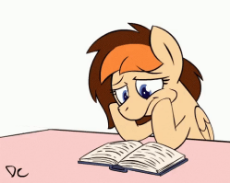
File (): 72BACD61CDF803B7E0FF44CB70E38065-43514.jpg (42.5 KB, 609x597, IMG_20190815_193938.jpg)

>>1698
Sorry poner, maybe 10 Pagés a day is too much? Por do you want a day to catch up?
I do realize it is hard to get in for those that just started too..
>>1697
Nice, someone else following along
It Is quite a book, honestly i didnt expect this when i just started, theres so much information compressed here that i can only compare it to philosophy books, it Is really similar at times.
Truly Adolf was a wise man, sad thing he lost the war. by reading this one realizes why they fear nazism so much, imagine if everyone was exposed yo this View of the world. Mein Kampf Is a giant redpill
Sorry poner, maybe 10 Pagés a day is too much? Por do you want a day to catch up?
I do realize it is hard to get in for those that just started too..
>>1697
Nice, someone else following along
It Is quite a book, honestly i didnt expect this when i just started, theres so much information compressed here that i can only compare it to philosophy books, it Is really similar at times.
Truly Adolf was a wise man, sad thing he lost the war. by reading this one realizes why they fear nazism so much, imagine if everyone was exposed yo this View of the world. Mein Kampf Is a giant redpill
>>1699
It is the first time in years I'm really reading a
book as well. This is the first time for me reading
a philosophically significant book in my life. But
for me, I'm following along quite nicely, I'm reading
the book in German though.
>spoiler
Truly makes me think. Citations could be used for
redpills, without revealing the original text of
course.
It is the first time in years I'm really reading a
book as well. This is the first time for me reading
a philosophically significant book in my life. But
for me, I'm following along quite nicely, I'm reading
the book in German though.
>spoiler
Truly makes me think. Citations could be used for
redpills, without revealing the original text of
course.
>>1700
Alright, we'll have a review on the previous chapters today, resuming friday and taking a break on the weekend.
We can leave no willing poner behind after all, and as >>1697
>this section of the book needs to be read at least twice to fully try to get its significance, at least for me.
This might prove itself to be heavy, so this will be good for all.
>>1701
Nice, sounds like you're a natural bookworm, anon
You should totally use that trait in the future.
>Citations could be used for redpills, without revealing the original text of course.
Good idea for redpilling larp nazis into actual nationalism and disproving lies thrown around to make the führer look bad.
Plus some quotes here are really relatable, they would alone get people interested in looking for the source.
Alright, we'll have a review on the previous chapters today, resuming friday and taking a break on the weekend.
We can leave no willing poner behind after all, and as >>1697
>this section of the book needs to be read at least twice to fully try to get its significance, at least for me.
This might prove itself to be heavy, so this will be good for all.
>>1701
Nice, sounds like you're a natural bookworm, anon
You should totally use that trait in the future.
>Citations could be used for redpills, without revealing the original text of course.
Good idea for redpilling larp nazis into actual nationalism and disproving lies thrown around to make the führer look bad.
Plus some quotes here are really relatable, they would alone get people interested in looking for the source.
>>1694
Lets compare then shall we?
>current version
Chapter 1 In The Home Of My Parents
IT HAS turned out fortunate for me to-day that destiny appointed Braunau-on-the-Inn to be my birthplace. For that little town is situated just on the frontier between those two States the reunion of which seems, at least to us of the younger generation, a task to which we should devote our lives and in the pursuit of which every possible means should be employed.
>Ford Version
1. CHILDHOOD HOME
Today, I am pleased that Fate chose the city of Braunau on the Inn of Northern Austria as my birthplace. This little town is on the frontier of the two German states whose reunion, at least for those of us from the younger generation, will be the accomplishment of a lifetime. We must do everything we can to reunite these states.
Lets compare then shall we?
>current version
Chapter 1 In The Home Of My Parents
IT HAS turned out fortunate for me to-day that destiny appointed Braunau-on-the-Inn to be my birthplace. For that little town is situated just on the frontier between those two States the reunion of which seems, at least to us of the younger generation, a task to which we should devote our lives and in the pursuit of which every possible means should be employed.
>Ford Version
1. CHILDHOOD HOME
Today, I am pleased that Fate chose the city of Braunau on the Inn of Northern Austria as my birthplace. This little town is on the frontier of the two German states whose reunion, at least for those of us from the younger generation, will be the accomplishment of a lifetime. We must do everything we can to reunite these states.
File (): A0F305657ADA0DD35AA86C855F37DB52-101274.jpg (98.9 KB, 680x986, 1563621884402.jpg)

>>1704
I'm reading this one:
https://mk.christogenea.org/_files/Mein_Kampf_German.pdf
Not sure if this is the best version though. It released in 1943 as a single book containing both chapters
I'm reading this one:
https://mk.christogenea.org/_files/Mein_Kampf_German.pdf
Not sure if this is the best version though. It released in 1943 as a single book containing both chapters
>>1705
Well shizzles
I'll do some research and comparsion between the two and the original when i get home, one does look shorter than the other but i would like to see how they stand against the original; To compare them to the actual intent of the author.
Well shizzles
I'll do some research and comparsion between the two and the original when i get home, one does look shorter than the other but i would like to see how they stand against the original; To compare them to the actual intent of the author.
>>1704
The Ford version seems more precise. It is written, phrased, and translated like a native English speaker, as evidenced by the comparison above. Its not about which is more accurate, I'm sure they're all accurate, its about how cumbersome the translation is.
The Ford version seems more precise. It is written, phrased, and translated like a native English speaker, as evidenced by the comparison above. Its not about which is more accurate, I'm sure they're all accurate, its about how cumbersome the translation is.
>>1706
>one looks shorter
Yeah the German one probably has longer sentences, so I'm on page 64 right now, not 60
>one looks shorter
Yeah the German one probably has longer sentences, so I'm on page 64 right now, not 60
File (): 3B9DB4C905D73C608718A76FF54DA39B-111461.jpg (108.8 KB, 938x821, 1563607930237.jpg)

File (): DFC30BF0E7FAE781541806B48575C321-59966.png (58.6 KB, 300x169, page_64.png)

File (): 72C0B3CEF1705B891126EA6DF063F320-175998.jpg (171.9 KB, 640x800, Cupcakes.jpg)

Alright, welcome back and be prepared for here comes a WoT
>I know that men are more rarely won over by the written word than they are by the spoken word and that every great movement in this world owes its growth to great speakers, not to great writers.
With that quote, let us start the recap of the previous pages;
>Austria must return to the great German mother country. Not for economic reasons. No, the economics are unimportant. Even if it did not make economic sense, it must still take place because common blood belongs in one common realm.
Within the first pages of the book (1-10) we get to know Hitler’s childhood and how he got his interest in war, books and even painting, as well as some insight in what it was like to live in Austria at that particular period.
One of the biggest points of the chapter is Hitler's confrontation with his father about which job young Hitler should pursue.
On the next pages (10-15) we first get to know his favourite school topics, how he became a nationalist, what it means to be a nationalist, how to truly learn history and a general idea of the importance of a nationalist country.
Then (15-18) we get to Hitler pursuing his dream as a painter, traveling to the city of Vienna and attempt to enter "The academy" just for then to get rejected as they saw him a better draftsman than painter.
Since he didn't had the required certification, Hitler’s dream was suddenly shattered as he could not study painting nor join the building School of Technology.
Then finally, after losing both his parents, traveling to the city of Vienna once again to pursue his new goal, becoming an architect.
And now (18-20) we get to Hitler slowly getting redpilled both on Marxism and Jews as well as the general situation of Germany at that time (decadent that is)
From 20 to 26, we get some extensive observations on the poor class, their habits and the vicious circle they are trapped in, as well as some comments on Social democracy.
At 26 till 30 we get a closer look at Social democracy, get an idea of what being well-read actually means and learn that, at the time, Hitler didn't had much interest in politics.
Then (30-36) we get an explanation on the social democratic tactics of control and how they exploit the lower (poor) class to get to their objective, how the real objective of the movement is not to improve said class but to treat is as a pawn and how even at that time manipulation of the media was used against the population.
We also get some insight on worker unions, why they are necessary and why they might get corrupted.
At 36 up to 37, Hitler starts talking about the Jews and how he at first was bluepilled about their existence, seeing them as religious persons wrongly discriminated.
From 38 to 40 we get a closer look at the press using cheap tricks to manipulate the masses, at page 39 we learn about the antisemitic party of Vienna, which at first Hitler didn't seem to like.
This is page 50 in Murphy's and page 38 in Ford's.
>>1707
For now, i'll stick to reading both books, Ford's seems to get to important points faster but Murphy's by being softer on the delivery transmits a more feets on the ground vibe, which i think might come useful in the future.
Quotes here will most likely come from both but anons should probably wanna stick to one of the two to not burnout.
>I know that men are more rarely won over by the written word than they are by the spoken word and that every great movement in this world owes its growth to great speakers, not to great writers.
With that quote, let us start the recap of the previous pages;
>Austria must return to the great German mother country. Not for economic reasons. No, the economics are unimportant. Even if it did not make economic sense, it must still take place because common blood belongs in one common realm.
Within the first pages of the book (1-10) we get to know Hitler’s childhood and how he got his interest in war, books and even painting, as well as some insight in what it was like to live in Austria at that particular period.
One of the biggest points of the chapter is Hitler's confrontation with his father about which job young Hitler should pursue.
On the next pages (10-15) we first get to know his favourite school topics, how he became a nationalist, what it means to be a nationalist, how to truly learn history and a general idea of the importance of a nationalist country.
Then (15-18) we get to Hitler pursuing his dream as a painter, traveling to the city of Vienna and attempt to enter "The academy" just for then to get rejected as they saw him a better draftsman than painter.
Since he didn't had the required certification, Hitler’s dream was suddenly shattered as he could not study painting nor join the building School of Technology.
Then finally, after losing both his parents, traveling to the city of Vienna once again to pursue his new goal, becoming an architect.
And now (18-20) we get to Hitler slowly getting redpilled both on Marxism and Jews as well as the general situation of Germany at that time (decadent that is)
From 20 to 26, we get some extensive observations on the poor class, their habits and the vicious circle they are trapped in, as well as some comments on Social democracy.
At 26 till 30 we get a closer look at Social democracy, get an idea of what being well-read actually means and learn that, at the time, Hitler didn't had much interest in politics.
Then (30-36) we get an explanation on the social democratic tactics of control and how they exploit the lower (poor) class to get to their objective, how the real objective of the movement is not to improve said class but to treat is as a pawn and how even at that time manipulation of the media was used against the population.
We also get some insight on worker unions, why they are necessary and why they might get corrupted.
At 36 up to 37, Hitler starts talking about the Jews and how he at first was bluepilled about their existence, seeing them as religious persons wrongly discriminated.
From 38 to 40 we get a closer look at the press using cheap tricks to manipulate the masses, at page 39 we learn about the antisemitic party of Vienna, which at first Hitler didn't seem to like.
This is page 50 in Murphy's and page 38 in Ford's.
>>1707
For now, i'll stick to reading both books, Ford's seems to get to important points faster but Murphy's by being softer on the delivery transmits a more feets on the ground vibe, which i think might come useful in the future.
Quotes here will most likely come from both but anons should probably wanna stick to one of the two to not burnout.
File (): 9DAA035002D9C6546F7793891A24ED1A-1582298.png (1.5 MB, 1775x681, something greater than seeking truth.png)

Pretty awesome that I just happened to have started reading excerpts of Mein Kampf (Ford translation) on VRChat, partially as a joke and partially to read it for the first time myself. I'm not very far into it but maybe this weekend I can catch up?
Have a little message from Cicada 3301 as a little thank you for the folks in this thread.
Have a little message from Cicada 3301 as a little thank you for the folks in this thread.
File (): 2916653104ED4F2F9D9EA3805E6A80F8-97602.jpg (95.3 KB, 1000x666, Oi vey.jpg)
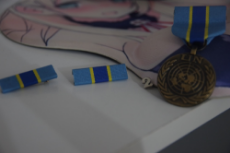
>>1712
>maybe this weekend I can catch up?
You can do it anon, depending on the book you only have to go through 38 pages!
Also
>A piece of metal
Actually you get three pieces of metal you will probably never wear
If you die you get like one but really big piece of metal, a flag and a nice coffin
>maybe this weekend I can catch up?
You can do it anon, depending on the book you only have to go through 38 pages!
Also
>A piece of metal
Actually you get three pieces of metal you will probably never wear
If you die you get like one but really big piece of metal, a flag and a nice coffin
>>1694
>>1695
Reading this, I am doing a comparison between that Social Democracy in the 20s and 30s and modern Liberalism, and how workers' unions are again an extension of it. Also the free press is not such at all, but it can be rightfully called again judenpresse. It is like history repeats itself.
>>1695
Reading this, I am doing a comparison between that Social Democracy in the 20s and 30s and modern Liberalism, and how workers' unions are again an extension of it. Also the free press is not such at all, but it can be rightfully called again judenpresse. It is like history repeats itself.
File (): EB9AF7A70316591CAFC16AB27B0ABE6B-160202.jpg (156.4 KB, 507x1200, 1565533944035.jpg)

Welcome back ladies and gentlecolts, i apologize for the late post but without further wait, lets start.
>A Jew can never be rescued from his fixed notions.
Edition
We start out with our boy Hitler quite mad at the pappers after realizing they might have a little More bias than expected;
>I was disgusted at the way in which this Vienna Press salaamed
obsequiously before the meanest steed belonging to the Habsburg royal equipage and
went off into wild ecstacies of delight if the nag wagged its tail in response. >At the
same time these newspapers took up an attitude of anxiety in matters that concerned
the German Emperor, trying to cloak their enmity by the serious air they gave
themselves. Naturally
they protested that they had no intention of mixing in Germany's internal affairs--God
forbid! They pretended that by touching a delicate spot in such a friendly way they
were fulfilling a duty that devolved upon them by reason of the mutual alliance
between the two countries and at the same time discharging their obligations of
journalistic truthfulness. Having thus excused themselves about tenderly touching a
sore spot, they bored with the finger ruthlessly into the wound.
From here, we get to learn on how Hitler went to know the anti-semitic movement (the Christian Socialist Movement) which at first he discarded as the bluepill was too strong.
>I now often turned to the VOLKSBLATT, which was much smaller in size but which treated such subjects more decently. I was not in accord with its sharp anti-Semitic tone; but again and again I found that its arguments gave me
grounds for serious thought.
In this chapter we basically learn a lot about how with enough research Hitler became redpilled
>My ideas about anti-Semitism changed also in the course of time, but that was the
change which I found most difficult. It cost me a greater internal conflict with myself,
and it was only after a struggle between reason and sentiment that victory began to be
decided in favour of the former. Two years later sentiment rallied to the side of reasons
and became a faithful guardian and counsellor.
While also learning about the favourite social strategy of the juice
>What soon gave me cause for very serious consideration were the activities of the Jews
in certain branches of life, into the mystery of which I penetrated little by little. Was
there any shady undertaking, any form of foulness, especially in cultural life, in which at least one Jew did not participate? On putting the probing knife carefully to that kind
of abscess one immediately discovered, like a maggot in a putrescent body, a little Jew
who was often blinded by the sudden light.
>Should the Jew, with the aid of his Marxist creed, triumph over the people of this world,
his Crown will be the funeral wreath of mankind, and this planet will once again follow
its orbit through ether, without any human life on its surface, as it did millions of years
ago.
And with this quote, we have the end of todays post;
>And so I believe to-day that my conduct is in accordance with the will of the Almighty
Creator. In standing guard against the Jew I am defending the handiwork of the Lord.
I am sorry for the short, rough post today, i had to writte it on my phone because busy day. Have a nice weekend break, anon
>A Jew can never be rescued from his fixed notions.
Edition
We start out with our boy Hitler quite mad at the pappers after realizing they might have a little More bias than expected;
>I was disgusted at the way in which this Vienna Press salaamed
obsequiously before the meanest steed belonging to the Habsburg royal equipage and
went off into wild ecstacies of delight if the nag wagged its tail in response. >At the
same time these newspapers took up an attitude of anxiety in matters that concerned
the German Emperor, trying to cloak their enmity by the serious air they gave
themselves. Naturally
they protested that they had no intention of mixing in Germany's internal affairs--God
forbid! They pretended that by touching a delicate spot in such a friendly way they
were fulfilling a duty that devolved upon them by reason of the mutual alliance
between the two countries and at the same time discharging their obligations of
journalistic truthfulness. Having thus excused themselves about tenderly touching a
sore spot, they bored with the finger ruthlessly into the wound.
From here, we get to learn on how Hitler went to know the anti-semitic movement (the Christian Socialist Movement) which at first he discarded as the bluepill was too strong.
>I now often turned to the VOLKSBLATT, which was much smaller in size but which treated such subjects more decently. I was not in accord with its sharp anti-Semitic tone; but again and again I found that its arguments gave me
grounds for serious thought.
In this chapter we basically learn a lot about how with enough research Hitler became redpilled
>My ideas about anti-Semitism changed also in the course of time, but that was the
change which I found most difficult. It cost me a greater internal conflict with myself,
and it was only after a struggle between reason and sentiment that victory began to be
decided in favour of the former. Two years later sentiment rallied to the side of reasons
and became a faithful guardian and counsellor.
While also learning about the favourite social strategy of the juice
>What soon gave me cause for very serious consideration were the activities of the Jews
in certain branches of life, into the mystery of which I penetrated little by little. Was
there any shady undertaking, any form of foulness, especially in cultural life, in which at least one Jew did not participate? On putting the probing knife carefully to that kind
of abscess one immediately discovered, like a maggot in a putrescent body, a little Jew
who was often blinded by the sudden light.
>Should the Jew, with the aid of his Marxist creed, triumph over the people of this world,
his Crown will be the funeral wreath of mankind, and this planet will once again follow
its orbit through ether, without any human life on its surface, as it did millions of years
ago.
And with this quote, we have the end of todays post;
>And so I believe to-day that my conduct is in accordance with the will of the Almighty
Creator. In standing guard against the Jew I am defending the handiwork of the Lord.
I am sorry for the short, rough post today, i had to writte it on my phone because busy day. Have a nice weekend break, anon
>>1717
You should hate phoneposting, profligate! Teasing, teasing. I used to phonepost here a lot too.
You should hate phoneposting, profligate! Teasing, teasing. I used to phonepost here a lot too.
File (): 04ABCCFBF00D7813FBC521478775D3D4-79584.png (77.7 KB, 1306x1472, The Pill "Genocide".png)
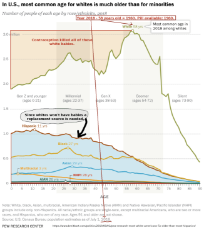
>Volk
Mein Kampf is about the previous war, it was before The Pill. Don't forget to update your copy with additional volk damage done by The Pill. And the volk paid cash for that damage too.
Mein Kampf is about the previous war, it was before The Pill. Don't forget to update your copy with additional volk damage done by The Pill. And the volk paid cash for that damage too.
File (): E7F010914949D9BCADE77D35595074B3-228902.png (223.5 KB, 1124x944, 1566668720047.png)
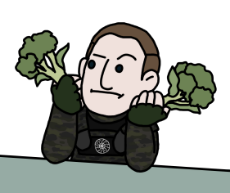
>>1719
Correlation =/= causation
Make a thread about it If you want to disuss the effecs of the pill; This is horse book discussion/reading
Correlation =/= causation
Make a thread about it If you want to disuss the effecs of the pill; This is horse book discussion/reading
File (): CAE349F371FEE67918267A7331872E66-26049.jpg (25.4 KB, 600x457, timetostopposting.jpg)
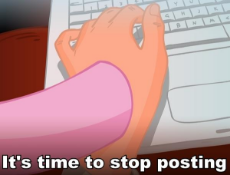
>Op is 1(one) day behind.
Hey guys, hope you're still reading despite the lack of posts yesterday.
I ran into some trouble (no pc for a few days) for such i would have to phonepost and that looks like shit.
So normalposting will most likely be resumed on monday, till then i'll keep on reading and hope you too do the same; By monday i'll post quotes from all the pages that should have been read (50 since weekend Is free)
So keep on reading, poners, see you on monday.
Hey guys, hope you're still reading despite the lack of posts yesterday.
I ran into some trouble (no pc for a few days) for such i would have to phonepost and that looks like shit.
So normalposting will most likely be resumed on monday, till then i'll keep on reading and hope you too do the same; By monday i'll post quotes from all the pages that should have been read (50 since weekend Is free)
So keep on reading, poners, see you on monday.
File (): 513D637E41CE34920A1B777F1BF85522-296423.png (289.5 KB, 2800x1990, mein kampf 1560310221698.png)

File (): CEEAE33C2C7A195EB411397EB5D2CC71-1391362.gif (1.3 MB, 400x317, 1517681365214.gif)

>>1758
Welcome back to this magnificent event, gentlecolts.
>WELTANSCHAUUNG Edition
Today is a very special day, for today we'll be getting 50 pages (that is 5 posts) since i ran into some PC issues.
Without further ado, let us start;
We start out with the führer addressing some basic needs for the wannabe politician:
>GENERALLY SPEAKING a man should not publicly take part in politics before he has reached the age of thirty
>A man must first acquire a fund of general ideas and fit them together so as to form an organic structure of personal thought or outlook on life--a WELTANSCHAUUNG.
>Then he will have that mental equipment without which he cannot form his own judgments on particular questions of the day
>Such a man is now qualified, at least subjectively, to take his part in the political conduct of public affairs.
Then we get some more thoughts on the matter.
>If these pre-requisite conditions are not fulfilled, and if a man should enter political life without this equipment, he will run a twofold risk. In the first place, he may find during the course of events that the stand which he originally took in regard to some essential question was wrong. He will now have to abandon his former position or else stick to it against his better knowledge and riper wisdom and after his reason and convictions have already proved it untenable.
Finishing with that, we get some more insight in german history and general thoughts on the city of vienna and what was leading to it's decay back in the day.
>Ten million people cannot permanently hold together a State of fifty millions, composed of different and convicting nationalities, unless certain definite pre-requisite conditions are at hand while there is still time to avail of them.
Then we get some insight on the importance of a homogeneous population and the importance of one unified language for a nation.
Welcome back to this magnificent event, gentlecolts.
>WELTANSCHAUUNG Edition
Today is a very special day, for today we'll be getting 50 pages (that is 5 posts) since i ran into some PC issues.
Without further ado, let us start;
We start out with the führer addressing some basic needs for the wannabe politician:
>GENERALLY SPEAKING a man should not publicly take part in politics before he has reached the age of thirty
>A man must first acquire a fund of general ideas and fit them together so as to form an organic structure of personal thought or outlook on life--a WELTANSCHAUUNG.
>Then he will have that mental equipment without which he cannot form his own judgments on particular questions of the day
>Such a man is now qualified, at least subjectively, to take his part in the political conduct of public affairs.
Then we get some more thoughts on the matter.
>If these pre-requisite conditions are not fulfilled, and if a man should enter political life without this equipment, he will run a twofold risk. In the first place, he may find during the course of events that the stand which he originally took in regard to some essential question was wrong. He will now have to abandon his former position or else stick to it against his better knowledge and riper wisdom and after his reason and convictions have already proved it untenable.
Finishing with that, we get some more insight in german history and general thoughts on the city of vienna and what was leading to it's decay back in the day.
>Ten million people cannot permanently hold together a State of fifty millions, composed of different and convicting nationalities, unless certain definite pre-requisite conditions are at hand while there is still time to avail of them.
Then we get some insight on the importance of a homogeneous population and the importance of one unified language for a nation.
File (): A680A5A4B23CB541D87F47110EA69382-1660868.gif (1.6 MB, 625x570, 1518207025628.gif)

>>1784
To start out on this part, we get some important quotes
>Up to the time that universal suffrage by secret ballot was introduced the German representatives had a majority in the Parliament. This situation gave cause for anxiety because the Social-Democratic fraction of the German element could not be relied upon when national questions were at stake.
>In matters that were of critical concern for the German element, the Social-Democrats always took up an anti-German stand because they were afraid of losing their followers among the other national groups.
>The introduction of universal suffrage put an end even to the purely numerical predominance of the German element.
>The way was now clear for the further 'de-Germanization' of the Austrian State.
>I soon became enraged by the hideous spectacle that met my eyes. Several hundred representatives were there to discuss a problem of great economical importance and each representative had the right to have his say
>The intellectual level of the debate was quite low.(...) Some times the debaters did not make themselves intelligible at all. Several of those present did not speak German but only their Slav vernaculars or dialects. Thus I had the opportunity of hearing with my own ears what I had been hitherto acquainted with only through reading the newspapers. A turbulent mass of people, all gesticulating and bawling against one another, with a pathetic old man shaking his bell and making frantic efforts to call the House to a sense of its dignity by friendly appeals, exhortations, and grave warnings.
>I could not refrain from laughing.
>I listened to the debates, as far as they could be understood, and I studied the more or less intelligent features of those 'elect' representatives of the various nationalities which composed that motley State. Gradually I formed my own ideas about what I saw.
>Democracy, as practised in Western Europe to-day, is the fore-runner of Marxism. In fact, the latter would not be conceivable without the former. Democracy is the breeding-ground in which the bacilli of the Marxist world pest can grow and spread.
>I am more than grateful to Fate that this problem came to my notice when I was still in Vienna; If I had been in Berlin when I first discovered what an illogical thing this institution is which we call Parliament, I might easily have gone to the other extreme and believed that the salvation of the people and the Empire could be secured only by restrengthening the principle of imperial authority. Those who had this belief did not discern the tendencies of their time and were blind to the aspirations of the people.
>Since this problem was specially difficult in regard to Austria, I was forced while still quite young to go into the essentials of the whole question more thoroughly than I otherwise should have done.
>Does anybody honestly believe that human progress originates in the composite brain of the majority and not in the brain of the individual personality?
>The parliamentary principle of vesting legislative power in the decision of the majority rejects the authority of the individual and puts a numerical quota of anonymous heads in its place. In doing so it contradicts the aristrocratic principle, which is a fundamental law of nature; but, of course, we must remember that in this decadent era of ours the aristrocratic principle need not be thought of as incorporated in the upper ten thousand.
>The inevitable result is that the intellectual level of the ruling class sinks steadily. One can easily forecast how much the nation and State are bound to suffer from such a condition of affairs, provided one does not belong to that same class of 'leaders'.
>The parliamentary régime in the old Austria was the very archetype of the institution as I have described it.
To start out on this part, we get some important quotes
>Up to the time that universal suffrage by secret ballot was introduced the German representatives had a majority in the Parliament. This situation gave cause for anxiety because the Social-Democratic fraction of the German element could not be relied upon when national questions were at stake.
>In matters that were of critical concern for the German element, the Social-Democrats always took up an anti-German stand because they were afraid of losing their followers among the other national groups.
>The introduction of universal suffrage put an end even to the purely numerical predominance of the German element.
>The way was now clear for the further 'de-Germanization' of the Austrian State.
>I soon became enraged by the hideous spectacle that met my eyes. Several hundred representatives were there to discuss a problem of great economical importance and each representative had the right to have his say
>The intellectual level of the debate was quite low.(...) Some times the debaters did not make themselves intelligible at all. Several of those present did not speak German but only their Slav vernaculars or dialects. Thus I had the opportunity of hearing with my own ears what I had been hitherto acquainted with only through reading the newspapers. A turbulent mass of people, all gesticulating and bawling against one another, with a pathetic old man shaking his bell and making frantic efforts to call the House to a sense of its dignity by friendly appeals, exhortations, and grave warnings.
>I could not refrain from laughing.
>I listened to the debates, as far as they could be understood, and I studied the more or less intelligent features of those 'elect' representatives of the various nationalities which composed that motley State. Gradually I formed my own ideas about what I saw.
>Democracy, as practised in Western Europe to-day, is the fore-runner of Marxism. In fact, the latter would not be conceivable without the former. Democracy is the breeding-ground in which the bacilli of the Marxist world pest can grow and spread.
>I am more than grateful to Fate that this problem came to my notice when I was still in Vienna; If I had been in Berlin when I first discovered what an illogical thing this institution is which we call Parliament, I might easily have gone to the other extreme and believed that the salvation of the people and the Empire could be secured only by restrengthening the principle of imperial authority. Those who had this belief did not discern the tendencies of their time and were blind to the aspirations of the people.
>Since this problem was specially difficult in regard to Austria, I was forced while still quite young to go into the essentials of the whole question more thoroughly than I otherwise should have done.
>Does anybody honestly believe that human progress originates in the composite brain of the majority and not in the brain of the individual personality?
>The parliamentary principle of vesting legislative power in the decision of the majority rejects the authority of the individual and puts a numerical quota of anonymous heads in its place. In doing so it contradicts the aristrocratic principle, which is a fundamental law of nature; but, of course, we must remember that in this decadent era of ours the aristrocratic principle need not be thought of as incorporated in the upper ten thousand.
>The inevitable result is that the intellectual level of the ruling class sinks steadily. One can easily forecast how much the nation and State are bound to suffer from such a condition of affairs, provided one does not belong to that same class of 'leaders'.
>The parliamentary régime in the old Austria was the very archetype of the institution as I have described it.
>>1785
>There is a better chance of seeing a camel pass through the eye of a needle than of seeing a really great man 'discovered' through an election.
>Whatever has happened in history above the level of the average of the broad public has mostly been due to the driving force of an individual personality.
>If we consider the fact that the problems which have to be discussed and solved belong to the most varied and diverse fields we can very well realize how inefficient a governing system must be which entrusts the right of decision to a mass assembly in which only very few possess the knowledge and experience such as would qualify them to deal with the matters that have to be settled. The most important economic measures are submitted to a tribunal in which not more than one-tenth of the members have studied the elements of economics. This means that final authority is vested in men who are utterly devoid of any preparatory training which might make them competent to decide on the questions at issue.
He keeps on talking about the cracks on the democratic system for a long while
>That is the reason why this brand of democracy has become a tool in the hand of that race which, because of the inner purposes it wishes to attain, must shun the open light, as it has always done and always will do. Only a Jew can praise an institution which is as corrupt and false as himself.
>As a contrast to this kind of democracy we have the German democracy, which is a true democracy; for here the leader is freely chosen and is obliged to accept full responsibility for all his actions and omissions. The problems to be dealt with are not put to the vote of the majority; but they are decided upon by the individual, and as a guarantee of responsibility for those decisions he pledges all he has in the world and even his life.
>Such were the views I formed after two years of attendance at the sessions of the Viennese Parliament. Then I went there no more.
Then we get some history on the house of hadsburg, culminating in
>After the great war of 1870-71 the House of Habsburg set to work with all its determination to exterminate the dangerous German element--about whose inner feelings and attitude there could be no doubt--slowly but deliberately. I use the word exterminate, because that alone expresses what must have been the final result of the Slavophile policy. Then it was that the fire of rebellion blazed up among the people whose extermination had been decreed. That fire was such as had never been witnessed in modern German history.
>For the first time nationalists and patriots were transformed into rebels.
>Generally speaking, we must not forget that the highest aim of human existence is not the maintenance of a State of Government but rather the conservation of the race.
>The rise and decline of the Pan-German movement on the one hand and the marvellous progress of the Christian-Socialist Party on the other, became a classic object of study for me, and as such they played an important part in the development of my own views.
>When I began to compare those two movements Fate placed before me the best means of understanding the causes of this puzzling problem. The action of Fate in this case was hastened by my own straitened circumstances
>I shall begin my analysis with an account of the two men who must be regarded as the founders and leaders of the two movements. These were George von Schönerer and Dr. Karl Lueger.
>They lived lives of immaculate and irreproachable probity amidst the miasma of all-round political corruption.
>When I compared their respective abilities Schönerer seemed to me a better and more profound thinker on fundamental problems. He foresaw the inevitable downfall of the Austrian State more clearly and accurately than anyone else. If this warning in regard to the Habsburg Empire had been heeded in Germany the disastrous world war, which involved Germany against the whole of Europe, would never have taken place.
>And herein lay Dr. Lueger's special talent. He had a rare gift of insight into human nature and he was very careful not to take men as something better than they were in reality.
>All ideas that this Pan-German had were right in the abstract, but he did not have the forcefulness or understanding necessary to put his ideas across to the broad masses. He was not able to formulate them so that they could be easily grasped by the masses.
>In all this Dr. Lueger was the opposite of Schönerer. His profound knowledge of human nature enabled him to form a correct estimate of the various social forces and it saved him from under-rating the power of existing institutions. And it was perhaps this very quality which enabled him to utilize those institutions as a means to serve the purposes of his policy.
>The aims which this really eminent man decided to pursue were intensely practical. He wished to conquer Vienna, the heart of the Monarchy. It was from Vienna that the last pulses of life beat through the diseased and worn-out body of the decrepit Empire. If the heart could be made healthier the others parts of the body were bound to revive. That idea was correct in principle; but the time within which it could be applied in practice was strictly limited. And that was the man's weak point.
>His achievements as Burgomaster of the City of Vienna are immortal, in the best sense of the word. But all that could not save the Monarchy. It came too late.
I really need some sleep so i'll keep posting later
I didnt even write comments this time
>There is a better chance of seeing a camel pass through the eye of a needle than of seeing a really great man 'discovered' through an election.
>Whatever has happened in history above the level of the average of the broad public has mostly been due to the driving force of an individual personality.
>If we consider the fact that the problems which have to be discussed and solved belong to the most varied and diverse fields we can very well realize how inefficient a governing system must be which entrusts the right of decision to a mass assembly in which only very few possess the knowledge and experience such as would qualify them to deal with the matters that have to be settled. The most important economic measures are submitted to a tribunal in which not more than one-tenth of the members have studied the elements of economics. This means that final authority is vested in men who are utterly devoid of any preparatory training which might make them competent to decide on the questions at issue.
He keeps on talking about the cracks on the democratic system for a long while
>That is the reason why this brand of democracy has become a tool in the hand of that race which, because of the inner purposes it wishes to attain, must shun the open light, as it has always done and always will do. Only a Jew can praise an institution which is as corrupt and false as himself.
>As a contrast to this kind of democracy we have the German democracy, which is a true democracy; for here the leader is freely chosen and is obliged to accept full responsibility for all his actions and omissions. The problems to be dealt with are not put to the vote of the majority; but they are decided upon by the individual, and as a guarantee of responsibility for those decisions he pledges all he has in the world and even his life.
>Such were the views I formed after two years of attendance at the sessions of the Viennese Parliament. Then I went there no more.
Then we get some history on the house of hadsburg, culminating in
>After the great war of 1870-71 the House of Habsburg set to work with all its determination to exterminate the dangerous German element--about whose inner feelings and attitude there could be no doubt--slowly but deliberately. I use the word exterminate, because that alone expresses what must have been the final result of the Slavophile policy. Then it was that the fire of rebellion blazed up among the people whose extermination had been decreed. That fire was such as had never been witnessed in modern German history.
>For the first time nationalists and patriots were transformed into rebels.
>Generally speaking, we must not forget that the highest aim of human existence is not the maintenance of a State of Government but rather the conservation of the race.
>The rise and decline of the Pan-German movement on the one hand and the marvellous progress of the Christian-Socialist Party on the other, became a classic object of study for me, and as such they played an important part in the development of my own views.
>When I began to compare those two movements Fate placed before me the best means of understanding the causes of this puzzling problem. The action of Fate in this case was hastened by my own straitened circumstances
>I shall begin my analysis with an account of the two men who must be regarded as the founders and leaders of the two movements. These were George von Schönerer and Dr. Karl Lueger.
>They lived lives of immaculate and irreproachable probity amidst the miasma of all-round political corruption.
>When I compared their respective abilities Schönerer seemed to me a better and more profound thinker on fundamental problems. He foresaw the inevitable downfall of the Austrian State more clearly and accurately than anyone else. If this warning in regard to the Habsburg Empire had been heeded in Germany the disastrous world war, which involved Germany against the whole of Europe, would never have taken place.
>And herein lay Dr. Lueger's special talent. He had a rare gift of insight into human nature and he was very careful not to take men as something better than they were in reality.
>All ideas that this Pan-German had were right in the abstract, but he did not have the forcefulness or understanding necessary to put his ideas across to the broad masses. He was not able to formulate them so that they could be easily grasped by the masses.
>In all this Dr. Lueger was the opposite of Schönerer. His profound knowledge of human nature enabled him to form a correct estimate of the various social forces and it saved him from under-rating the power of existing institutions. And it was perhaps this very quality which enabled him to utilize those institutions as a means to serve the purposes of his policy.
>The aims which this really eminent man decided to pursue were intensely practical. He wished to conquer Vienna, the heart of the Monarchy. It was from Vienna that the last pulses of life beat through the diseased and worn-out body of the decrepit Empire. If the heart could be made healthier the others parts of the body were bound to revive. That idea was correct in principle; but the time within which it could be applied in practice was strictly limited. And that was the man's weak point.
>His achievements as Burgomaster of the City of Vienna are immortal, in the best sense of the word. But all that could not save the Monarchy. It came too late.
I really need some sleep so i'll keep posting later
I didnt even write comments this time
File (): 937780A12B8F200725BA4BE1C70772E2-93025.jpg (90.8 KB, 660x1057, cover.jpg)
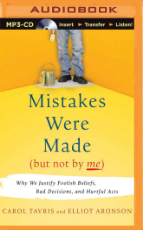
File (): 33C092C234817EA2D514375F989ABD17-1768290.pdf (1.7 MB, , Mistakes Were Made (But Not by Me)_ Why We - Carol Tavris.pdf)
File (): 272EB75ED7450BFCD58C9B6E6FCE0A6B-309793.zip (302.5 KB, Listing of : C:\____\mlpolbackup_backups\backup\ub\src\1567559134183-2.zip
Size Date Time Name
-------- -------- ------ ---------
20 05-07-11 01:11 mimetype
244 05-07-11 01:11 META-INF/container.xml
7474 05-07-11 01:11 content.opf
4722 05-07-11 01:11 cover.jpeg
553 05-07-11 01:11 Mistakes_Were_Made_split_000.html
630 05-07-11 01:11 Mistakes_Were_Made_split_001.html
607 05-07-11 01:11 Mistakes_Were_Made_split_002.html
4098 05-07-11 01:11 Mistakes_Were_Made_split_003.html
2314 05-07-11 01:11 Mistakes_Were_Made_split_004.html
......... (only showing the 10 first files) ......... , Mistakes-Were-Made-But-Not-by-Me-Why-We-Justify-Foolish-Beliefs-Bad-Decisions-and-Hurtful-Acts-.epub.zip)
I'd like to present a contribution of my own to this thread:
[align=center]Mistakes Were Made (But Not By Me)[/align]
In both a quick little PDF conversion and my own EPUB original.
Psychological books are a weakness of mine, and this one is one of my recent favourites. I'd like to at least start a little read-along of this one, see if I can't ignite some interest and to justify re-reading it myself.
[align=center]Mistakes Were Made (But Not By Me)[/align]
In both a quick little PDF conversion and my own EPUB original.
Psychological books are a weakness of mine, and this one is one of my recent favourites. I'd like to at least start a little read-along of this one, see if I can't ignite some interest and to justify re-reading it myself.
>>1788
Before the book even gets to the introductory chapter, it presents us with two fantastic quotes:
We are all capable of believing things which we know to be untrue, and then, when we are finally proved wrong, impudently twisting the facts so as to show that we were right. Intellectually, it is possible to carry on this process for an indefinite time: the only check on it is that sooner or later a false belief bumps up against solid reality, usually on a battlefield.
[align=right]—George Orwell (1946)[/align]
A great nation is like a great man:
When he makes a mistake, he realizes it.
Having realized it, he admits it.
Having admitted it, he corrects it.
He considers those who point out his faults as his most benevolent teachers.
[align=right]—Lao Tzu[/align]
And then, we meet the introductory chapter of the book:
Knaves, Fools, Villains, and Hypocrites: How Do They Live with Themselves?
Which then opens with four more quotes:
Mistakes were quite possibly made by the administrations in which I served.
[align=right]Henry Kissinger, responding to charges that he committed war crimes in his role in the United States' actions in Vietnam, Cambodia, and South America in the 1970s[/align]
If, in hindsight, we also discover that mistakes may have been made ... I am deeply sorry.
[align=right]—Cardinal Edward Egan of New York, referring to the bishops who failed to deal with child molesters among the Catholic clergy[/align]
Mistakes were made in communicating to the public and customers about the ingredients in our French fries and hash browns.
[align=right]—McDonald's, apologizing to Hindus and other vegetarians for failing to inform them that the "natural flavoring" in their potatoes contained beef byproducts[/align]
This week's question: How can you tell when a presidential scandal is serious?
A. The president's poll numbers drop.
B. The press goes after him.
C. The opposition calls for his impeachment.
D. His own party members turn on him.
E. Or the White House says, "mistakes were made"
[align=right]—Bill Schneider on CNN's Inside Politics[/align]
Finally, we get to the corpus, the real meat of things. The authors lay the groundwork for the titular self-justification in these next few parts, and as you'll likely notice going through this, they're very heavy on using examples to drive their points home. I'll do my best to paraphrase some of these examples when they come up, but most of the time I'll just wind up Ctrl-C'ing a lot of things, since the writing in this is very good at conveying it's full meaning without me to flub it up.
I'll start us off with a good 2/3rds of the introduction chapter.
> AS FALLIBLE HUMAN BEINGS, all of us share the impulse to justify ourselves and avoid taking responsibility for any actions that turn out to be harmful, immoral, or stupid. Most of us will never be in a position to make decisions affecting the lives and deaths of millions of people, but whether the consequences of our mistakes are trivial or tragic, on a small scale or a national canvas, most of us find it difficult, if not impossible, to say,
> "I was wrong; I made a terrible mistake."
> The higher the stakes—emotional, financial, moral—the greater the difficulty.
> It goes further than that: Most people, when directly confronted by evidence that they are wrong, do not change their point of view or course of action but justify it even more tenaciously. Even irrefutable evidence is rarely enough to pierce the mental armor of self-justification.
> When we began working on this book, the poster boy for "tenacious clinging to a discredited belief" was George W. Bush. Bush was wrong in his claim that Saddam Hussein had weapons of mass destruction, he was wrong in claiming that Saddam was linked with Al Qaeda, he was wrong in predicting that Iraqis would be dancing joyfully in the streets to receive the American soldiers, he was wrong in predicting that the conflict would be over quickly, he was wrong in his gross underestimate of the financial cost of the war, and he was most famously wrong in his photo-op speech six weeks after the invasion began, when he announced (under a banner reading MISSION ACCOMPLISHED) that "major combat operations in Iraq have ended."
> [ ... ] In 2006, with Iraq sliding into civil war and sixteen American intelligence agencies having issued a report that the occupation of Iraq had increased Islamic radicalism and the risk of terrorism, Bush said to a delegation of conservative columnists, "I've never been more convinced that the decisions I made are the right decisions." [1] Of course, Bush had to justify the war his administration pursued in Iraq; he had too much invested in that course of action to do otherwise—thousands of deaths and, according to a conservative estimate from the American Enterprise Institute in 2006, at least a trillion dollars.
> Accordingly, when he was proved wrong in his original reasons for the war, he found new ones: getting rid of a "very bad guy," fighting terrorists, promoting peace in the Middle East, bringing democracy to Iraq, increasing the security of the United States, and finishing "the task [our troops] gave their lives for." In other words, we must continue the war because we began the war.
Before the book even gets to the introductory chapter, it presents us with two fantastic quotes:
We are all capable of believing things which we know to be untrue, and then, when we are finally proved wrong, impudently twisting the facts so as to show that we were right. Intellectually, it is possible to carry on this process for an indefinite time: the only check on it is that sooner or later a false belief bumps up against solid reality, usually on a battlefield.
[align=right]—George Orwell (1946)[/align]
A great nation is like a great man:
When he makes a mistake, he realizes it.
Having realized it, he admits it.
Having admitted it, he corrects it.
He considers those who point out his faults as his most benevolent teachers.
[align=right]—Lao Tzu[/align]
And then, we meet the introductory chapter of the book:
Knaves, Fools, Villains, and Hypocrites: How Do They Live with Themselves?
Which then opens with four more quotes:
Mistakes were quite possibly made by the administrations in which I served.
[align=right]Henry Kissinger, responding to charges that he committed war crimes in his role in the United States' actions in Vietnam, Cambodia, and South America in the 1970s[/align]
If, in hindsight, we also discover that mistakes may have been made ... I am deeply sorry.
[align=right]—Cardinal Edward Egan of New York, referring to the bishops who failed to deal with child molesters among the Catholic clergy[/align]
Mistakes were made in communicating to the public and customers about the ingredients in our French fries and hash browns.
[align=right]—McDonald's, apologizing to Hindus and other vegetarians for failing to inform them that the "natural flavoring" in their potatoes contained beef byproducts[/align]
This week's question: How can you tell when a presidential scandal is serious?
A. The president's poll numbers drop.
B. The press goes after him.
C. The opposition calls for his impeachment.
D. His own party members turn on him.
E. Or the White House says, "mistakes were made"
[align=right]—Bill Schneider on CNN's Inside Politics[/align]
Finally, we get to the corpus, the real meat of things. The authors lay the groundwork for the titular self-justification in these next few parts, and as you'll likely notice going through this, they're very heavy on using examples to drive their points home. I'll do my best to paraphrase some of these examples when they come up, but most of the time I'll just wind up Ctrl-C'ing a lot of things, since the writing in this is very good at conveying it's full meaning without me to flub it up.
I'll start us off with a good 2/3rds of the introduction chapter.
> AS FALLIBLE HUMAN BEINGS, all of us share the impulse to justify ourselves and avoid taking responsibility for any actions that turn out to be harmful, immoral, or stupid. Most of us will never be in a position to make decisions affecting the lives and deaths of millions of people, but whether the consequences of our mistakes are trivial or tragic, on a small scale or a national canvas, most of us find it difficult, if not impossible, to say,
> "I was wrong; I made a terrible mistake."
> The higher the stakes—emotional, financial, moral—the greater the difficulty.
> It goes further than that: Most people, when directly confronted by evidence that they are wrong, do not change their point of view or course of action but justify it even more tenaciously. Even irrefutable evidence is rarely enough to pierce the mental armor of self-justification.
> When we began working on this book, the poster boy for "tenacious clinging to a discredited belief" was George W. Bush. Bush was wrong in his claim that Saddam Hussein had weapons of mass destruction, he was wrong in claiming that Saddam was linked with Al Qaeda, he was wrong in predicting that Iraqis would be dancing joyfully in the streets to receive the American soldiers, he was wrong in predicting that the conflict would be over quickly, he was wrong in his gross underestimate of the financial cost of the war, and he was most famously wrong in his photo-op speech six weeks after the invasion began, when he announced (under a banner reading MISSION ACCOMPLISHED) that "major combat operations in Iraq have ended."
> [ ... ] In 2006, with Iraq sliding into civil war and sixteen American intelligence agencies having issued a report that the occupation of Iraq had increased Islamic radicalism and the risk of terrorism, Bush said to a delegation of conservative columnists, "I've never been more convinced that the decisions I made are the right decisions." [1] Of course, Bush had to justify the war his administration pursued in Iraq; he had too much invested in that course of action to do otherwise—thousands of deaths and, according to a conservative estimate from the American Enterprise Institute in 2006, at least a trillion dollars.
> Accordingly, when he was proved wrong in his original reasons for the war, he found new ones: getting rid of a "very bad guy," fighting terrorists, promoting peace in the Middle East, bringing democracy to Iraq, increasing the security of the United States, and finishing "the task [our troops] gave their lives for." In other words, we must continue the war because we began the war.
>>1789
> Politicians are the most visible of self-justifiers, which is why they provide such juicy examples. They have refined the art of speaking in the passive voice; when their backs are to the wall they will reluctantly acknowledge error, but not responsibility. Oh all right, mistakes were made, but not by me; by someone else, who shall remain nameless. [2] When Henry Kissinger said that the "administration" may have made mistakes, he was sidestepping the fact that as national security adviser and secretary of state (simultaneously) he, in effect, was the administration. This self-justification allowed him to accept the Nobel Peace Prize with a straight face and a clear conscience.
> We look at the behavior of politicians with amusement or alarm or horror, but, psychologically, what they do is no different in kind, though certainly in consequence, from what most of us have done at one time or another in our private lives.
> We stay in an unhappy relationship or merely one that is going nowhere because, after all, we invested so much time in making it work.
> We stay in a deadening job way too long because we look for all the reasons to justify staying and are unable to clearly assess the benefits of leaving.
> We buy a lemon of a car because it looks gorgeous, spend thousands of dollars to keep the damn thing running, and then we spend even more to justify that investment.
> We self-righteously create a rift with a friend or relative over some real or imagined slight, yet see ourselves as the pursuers of peace—if only the other side would apologize and make amends.
> Self-justification is not the same thing as lying or making excuses. Obviously, people will lie or invent fanciful stories to duck the fury of a lover, parent, or employer; to keep from being sued or sent to prison; to avoid losing face; to avoid losing a job; to stay in power. But there is a big difference between what a guilty man says to the public to convince them of something he knows is untrue ...
> ("I did not have sex with that woman")
> ("I am not a crook")
> ... and the process of persuading himself that he did a good thing. In the former situation, he is lying and knows he is lying to save his own skin. In the latter, he is lying to himself. That is why self-justification is more powerful and more dangerous than the explicit lie. It allows people to convince themselves that what they did was the best thing they could have done. In fact, come to think of it, it was the right thing.
> "There was nothing else I could have done."
> "Actually, it was a brilliant solution to the problem."
> "I was doing the best for the nation."
> "Those bastards deserved what they got."
> "I'm entitled."
> Self-justification not only minimizes our mistakes and bad decisions; it is also the reason that everyone can see a hypocrite in action except the hypocrite. It allows us to create a distinction between our moral lapses and someone else's, and to blur the discrepancy between our actions and our moral convictions. Aldous Huxley was right when he said, "There is probably no such thing as a conscious hypocrite." [ ... ]
Remember when I said the authors are heavy on examples? The authors then go on to offer more instances of dissonance and doublethink employed in your (possible) day-to-day lives.
> For example, have you ever done a little finessing of expenses on income taxes? That probably compensates for the legitimate expenses you forgot about, and besides, you'd be a fool not to, considering that everybody else does.
> Did you fail to report some extra cash income? You're entitled, given all the money that the government wastes on pork-barrel projects and programs you detest.
> Have you been writing personal e-mails and surfing the Net at your office when you should have been tending to business? Those are perks of the job, and besides, it's your own protest against those stupid company rules, and besides, your boss doesn't appreciate all the extra work you do.
There's even a real, non-hypothetical example where an ethics and philosophy professor smudges ink on the bed of his hotel room by mistake, then justifies it to himself:
> "One of them told me to stop with the moral fanaticism. He argued, 'The management expects such accidents and builds their cost into the price of the rooms.' It did not take long to persuade me that there was no need to trouble the manager. I reasoned that if I had spilled this ink in a family-owned bed-and-breakfast, then I would have immediately reported the accident, but that this was a chain hotel, and yadda yadda yadda went the hoodwinking process. [ ... ]"
Then the authors go on to predict that some of you are going to justify yourselves by proclaiming that your justifications are actually true, and not a total load. To which they respond:
> Whether those claims are true or false is irrelevant. When we cross these lines, we are justifying behavior that we know is wrong precisely so that we can continue to see ourselves as honest people and not criminals or thieves. Whether the behavior in question is a small thing like spilling ink on a hotel bedspread, or a big thing like embezzlement, the mechanism of self-justification is the same.
> Politicians are the most visible of self-justifiers, which is why they provide such juicy examples. They have refined the art of speaking in the passive voice; when their backs are to the wall they will reluctantly acknowledge error, but not responsibility. Oh all right, mistakes were made, but not by me; by someone else, who shall remain nameless. [2] When Henry Kissinger said that the "administration" may have made mistakes, he was sidestepping the fact that as national security adviser and secretary of state (simultaneously) he, in effect, was the administration. This self-justification allowed him to accept the Nobel Peace Prize with a straight face and a clear conscience.
> We look at the behavior of politicians with amusement or alarm or horror, but, psychologically, what they do is no different in kind, though certainly in consequence, from what most of us have done at one time or another in our private lives.
> We stay in an unhappy relationship or merely one that is going nowhere because, after all, we invested so much time in making it work.
> We stay in a deadening job way too long because we look for all the reasons to justify staying and are unable to clearly assess the benefits of leaving.
> We buy a lemon of a car because it looks gorgeous, spend thousands of dollars to keep the damn thing running, and then we spend even more to justify that investment.
> We self-righteously create a rift with a friend or relative over some real or imagined slight, yet see ourselves as the pursuers of peace—if only the other side would apologize and make amends.
> Self-justification is not the same thing as lying or making excuses. Obviously, people will lie or invent fanciful stories to duck the fury of a lover, parent, or employer; to keep from being sued or sent to prison; to avoid losing face; to avoid losing a job; to stay in power. But there is a big difference between what a guilty man says to the public to convince them of something he knows is untrue ...
> ("I did not have sex with that woman")
> ("I am not a crook")
> ... and the process of persuading himself that he did a good thing. In the former situation, he is lying and knows he is lying to save his own skin. In the latter, he is lying to himself. That is why self-justification is more powerful and more dangerous than the explicit lie. It allows people to convince themselves that what they did was the best thing they could have done. In fact, come to think of it, it was the right thing.
> "There was nothing else I could have done."
> "Actually, it was a brilliant solution to the problem."
> "I was doing the best for the nation."
> "Those bastards deserved what they got."
> "I'm entitled."
> Self-justification not only minimizes our mistakes and bad decisions; it is also the reason that everyone can see a hypocrite in action except the hypocrite. It allows us to create a distinction between our moral lapses and someone else's, and to blur the discrepancy between our actions and our moral convictions. Aldous Huxley was right when he said, "There is probably no such thing as a conscious hypocrite." [ ... ]
Remember when I said the authors are heavy on examples? The authors then go on to offer more instances of dissonance and doublethink employed in your (possible) day-to-day lives.
> For example, have you ever done a little finessing of expenses on income taxes? That probably compensates for the legitimate expenses you forgot about, and besides, you'd be a fool not to, considering that everybody else does.
> Did you fail to report some extra cash income? You're entitled, given all the money that the government wastes on pork-barrel projects and programs you detest.
> Have you been writing personal e-mails and surfing the Net at your office when you should have been tending to business? Those are perks of the job, and besides, it's your own protest against those stupid company rules, and besides, your boss doesn't appreciate all the extra work you do.
There's even a real, non-hypothetical example where an ethics and philosophy professor smudges ink on the bed of his hotel room by mistake, then justifies it to himself:
> "One of them told me to stop with the moral fanaticism. He argued, 'The management expects such accidents and builds their cost into the price of the rooms.' It did not take long to persuade me that there was no need to trouble the manager. I reasoned that if I had spilled this ink in a family-owned bed-and-breakfast, then I would have immediately reported the accident, but that this was a chain hotel, and yadda yadda yadda went the hoodwinking process. [ ... ]"
Then the authors go on to predict that some of you are going to justify yourselves by proclaiming that your justifications are actually true, and not a total load. To which they respond:
> Whether those claims are true or false is irrelevant. When we cross these lines, we are justifying behavior that we know is wrong precisely so that we can continue to see ourselves as honest people and not criminals or thieves. Whether the behavior in question is a small thing like spilling ink on a hotel bedspread, or a big thing like embezzlement, the mechanism of self-justification is the same.
File (): 5B6645616ED39D667EFB6CF47ECE39BA-1693.txt (1.7 KB, , citations.txt)
>>1790
The next section of the intro goes on to indict memory as another source of justification, along with a whole lot of detailed examples. But I'm going to stop myself right here, lest I eclipse the entire thread.
I hope this partial look at the intro has you intrigued, because the intro is just a taster for the really, really interesting stuff later on. The book has 8 chapters in total, is replete with examples (and citations!), and in order to fully explore the ways we justify ourselves, the chapters go over:
Cognitive Dissonance
Pride and Prejudice
Memory
Bad science & Le Skepticism
Police & Prosecution
Failed marriages
Causing and receiving harm
Some of the examples are absolutely fantastic: LA's "Museum of Tolerance" has a set of two doors, "Prejudiced" and "Unprejudiced", the latter of which is locked and you can't go through. A set of four Jews were angrily banging on the "Unprejudiced" door, demanding that some goy let them in.
While it's obvious the writers swing more to the left, including that example was ballsy, and they do a surprisingly good job of excising their biases.
In the spirit of "trust but verify", every time there's a citation ([1], [2], etc.), I'll attach a .txt of the citations, archived and paraphrased, for your perusal. Just so I don't break the flow too badly.
Should I continue?
The next section of the intro goes on to indict memory as another source of justification, along with a whole lot of detailed examples. But I'm going to stop myself right here, lest I eclipse the entire thread.
I hope this partial look at the intro has you intrigued, because the intro is just a taster for the really, really interesting stuff later on. The book has 8 chapters in total, is replete with examples (and citations!), and in order to fully explore the ways we justify ourselves, the chapters go over:
Cognitive Dissonance
Pride and Prejudice
Memory
Bad science & Le Skepticism
Police & Prosecution
Failed marriages
Causing and receiving harm
Some of the examples are absolutely fantastic: LA's "Museum of Tolerance" has a set of two doors, "Prejudiced" and "Unprejudiced", the latter of which is locked and you can't go through. A set of four Jews were angrily banging on the "Unprejudiced" door, demanding that some goy let them in.
While it's obvious the writers swing more to the left, including that example was ballsy, and they do a surprisingly good job of excising their biases.
In the spirit of "trust but verify", every time there's a citation ([1], [2], etc.), I'll attach a .txt of the citations, archived and paraphrased, for your perusal. Just so I don't break the flow too badly.
Should I continue?
File (): 3A912FC7D974C587E6CA4383CF804782-2291097.jpg (2.2 MB, 2557x1500, Hiteru.jpg)
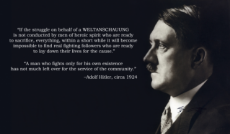
>>621
Quotes and quotes while i read i post quotes
and (you) too can do the same.
>In order to assure the possibility of carrying through a really strenuous struggle, the Pan-German Movement should have devoted its efforts to winning over the masses. The failure to do this left the movement from the very beginning without the elementary impulse which such a wave needs if it is not to ebb within a short while.
Even if it is the obvious, it still needs to be pointed out.
>The Press either ignored them totally or so mutilated their speeches that the logical consistency was destroyed or the meaning twisted round in such a way that the public got only a very wrong impression regarding the aims of the new movement. What the individual members said was not of importance. The important matter was what people read as coming from them. This consisted of mere extracts which had been torn out of the context of the speeches and gave an impression of incoherent nonsense, which indeed was purposely meant.
Journalism.txt
>A man who fights only for his own existence has not much left over for the service of the community.
That's a great quote for a pic, you know what, it's too good to just leave it here like that
>Pic related
>If a movement should offer a large number of positions and offices that are easily accessible the number of unworthy candidates admitted to membership will be constantly on the increase and eventually a day will come when there will be such a preponderance of political profiteers among the membership of a successful Party that the combatants who bore the brunt of the battle in the earlier stages of the movement can now scarcely recognize their own Party and may be ejected by the later arrivals as unwanted ballast.
The replacement effect but a hundread years ago.
>The doom of a nation can be averted only by a storm of glowing passion; but only those who are passionate themselves can arouse passion in others. It is only through the capacity for passionate feeling that chosen leaders can wield the power of the word which, like hammer blows, will open the door to the hearts of the people.
Some golden quotes this time
>A movement which has great ends to achieve must carefully guard against the danger of losing contact with the masses of the people. Every problem encountered must be examined from this viewpoint first of all and the decision to be made must always be in harmony with this principle.
Important
>The movement must avoid everything which might lessen or weaken its power of influencing the masses; not from demagogical motives but because of the simple fact that no great idea, no matter how sublime and exalted it may appear, can be realized in practice without the effective power which resides in the popular masses. Stern reality alone must mark the way to the goal. To be unwilling to walk the road of hardship means, only too often in this world, the total renunciation of our aims and purposes, whether that renunciation be consciously willed or not.
Also important, on the same topic.
>If there had been a proper appreciation (by the Pan-German Movement) of the tremendous powers of endurance always shown by the masses in revolutionary movements a different attitude towards the social problem would have been taken, and also a different policy in the matter of propaganda. Then the centre of gravity of the movement would not have been transferred to the Parliament but would have remained in the workshops and in the streets.
Speaking about the fall of the Pan-German Movement
>Any attempt at a national revival will be opposed if the preliminary condition of such a revival be that a bad and pernicious regime must first of all be overthrown; because such an action will be considered as a violation of the 'Authority of the State'.
>In the eyes of those who take that standpoint, the 'Authority of the State' is not a means which is there to serve an end but rather, to the mind of the dogmatic believer in objectivity, it is an end in itself.
>Such people would raise an outcry, if, for instance, anyone should attempt to set up a dictatorship, even though the man responsible for it were Frederick the Great and even though the politicians for the time being were small and incompetent men.
>To such sticklers for abstract principles the law of democracy is more sacred than the welfare of the nation. In accordance with his principles, one of these gentry will defend the worst kind of tyranny, though it may be leading a people to ruin, because it is the fleeting embodiment of the 'Authority of the State', and another will reject even a highly beneficent government if it should happen not to be in accord with his notion of 'democracy'.
>In the same way our German pacifist will remain silent while the nation is groaning under an oppression which is being exercised by a sanguinary military power, when this state of affairs gives rise to active resistance; because such resistance means the employment of physical force, which is against the spirit of the pacifist associations.
>The German International Socialist may be rooked and plundered by his comrades in all the other countries of the world in the name of 'solidarity', but he responds with fraternal kindness and never thinks of trying to get his own back, or even of defending himself. And why? Because he is a German.
"Because he is a g*rman"
>Such conduct is not the manifestation of a malicious intent, nor is it the outcome of orders given from 'above', as we say; but such a lack of national grit and determination is due to defects in our educational system.
>It may be unpleasant to dwell on such truths, but if something is to be changed we must start by diagnosing the disease.
Quotes and quotes while i read i post quotes
and (you) too can do the same.
>In order to assure the possibility of carrying through a really strenuous struggle, the Pan-German Movement should have devoted its efforts to winning over the masses. The failure to do this left the movement from the very beginning without the elementary impulse which such a wave needs if it is not to ebb within a short while.
Even if it is the obvious, it still needs to be pointed out.
>The Press either ignored them totally or so mutilated their speeches that the logical consistency was destroyed or the meaning twisted round in such a way that the public got only a very wrong impression regarding the aims of the new movement. What the individual members said was not of importance. The important matter was what people read as coming from them. This consisted of mere extracts which had been torn out of the context of the speeches and gave an impression of incoherent nonsense, which indeed was purposely meant.
Journalism.txt
>A man who fights only for his own existence has not much left over for the service of the community.
That's a great quote for a pic, you know what, it's too good to just leave it here like that
>Pic related
>If a movement should offer a large number of positions and offices that are easily accessible the number of unworthy candidates admitted to membership will be constantly on the increase and eventually a day will come when there will be such a preponderance of political profiteers among the membership of a successful Party that the combatants who bore the brunt of the battle in the earlier stages of the movement can now scarcely recognize their own Party and may be ejected by the later arrivals as unwanted ballast.
The replacement effect but a hundread years ago.
>The doom of a nation can be averted only by a storm of glowing passion; but only those who are passionate themselves can arouse passion in others. It is only through the capacity for passionate feeling that chosen leaders can wield the power of the word which, like hammer blows, will open the door to the hearts of the people.
Some golden quotes this time
>A movement which has great ends to achieve must carefully guard against the danger of losing contact with the masses of the people. Every problem encountered must be examined from this viewpoint first of all and the decision to be made must always be in harmony with this principle.
Important
>The movement must avoid everything which might lessen or weaken its power of influencing the masses; not from demagogical motives but because of the simple fact that no great idea, no matter how sublime and exalted it may appear, can be realized in practice without the effective power which resides in the popular masses. Stern reality alone must mark the way to the goal. To be unwilling to walk the road of hardship means, only too often in this world, the total renunciation of our aims and purposes, whether that renunciation be consciously willed or not.
Also important, on the same topic.
>If there had been a proper appreciation (by the Pan-German Movement) of the tremendous powers of endurance always shown by the masses in revolutionary movements a different attitude towards the social problem would have been taken, and also a different policy in the matter of propaganda. Then the centre of gravity of the movement would not have been transferred to the Parliament but would have remained in the workshops and in the streets.
Speaking about the fall of the Pan-German Movement
>Any attempt at a national revival will be opposed if the preliminary condition of such a revival be that a bad and pernicious regime must first of all be overthrown; because such an action will be considered as a violation of the 'Authority of the State'.
>In the eyes of those who take that standpoint, the 'Authority of the State' is not a means which is there to serve an end but rather, to the mind of the dogmatic believer in objectivity, it is an end in itself.
>Such people would raise an outcry, if, for instance, anyone should attempt to set up a dictatorship, even though the man responsible for it were Frederick the Great and even though the politicians for the time being were small and incompetent men.
>To such sticklers for abstract principles the law of democracy is more sacred than the welfare of the nation. In accordance with his principles, one of these gentry will defend the worst kind of tyranny, though it may be leading a people to ruin, because it is the fleeting embodiment of the 'Authority of the State', and another will reject even a highly beneficent government if it should happen not to be in accord with his notion of 'democracy'.
>In the same way our German pacifist will remain silent while the nation is groaning under an oppression which is being exercised by a sanguinary military power, when this state of affairs gives rise to active resistance; because such resistance means the employment of physical force, which is against the spirit of the pacifist associations.
>The German International Socialist may be rooked and plundered by his comrades in all the other countries of the world in the name of 'solidarity', but he responds with fraternal kindness and never thinks of trying to get his own back, or even of defending himself. And why? Because he is a German.
"Because he is a g*rman"
>Such conduct is not the manifestation of a malicious intent, nor is it the outcome of orders given from 'above', as we say; but such a lack of national grit and determination is due to defects in our educational system.
>It may be unpleasant to dwell on such truths, but if something is to be changed we must start by diagnosing the disease.
File (): 52A6E5EF9285175805F150E2BA640222-10654847.jpg (10.2 MB, 7684x4961, Hiteru2.jpg)
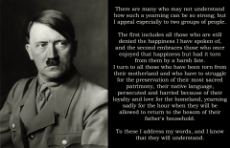
And today's quote is...
>pic related
>Do you feel that Providence has called you to proclaim the Truth to the world? If so, then go and do it. But you ought to have the courage to do it directly and not use some political party as your mouthpiece; for in this way you shirk your vocation. In the place of something that now exists and is bad put something else that is better and will last into the future.
He was talking about the church, but this applies to a lot of things
>(...) do not try to reach the goal by the roundabout way of a political party if you are not brave enough to fight with your visor lifted.
This is why the left loves to ruin people's lives by doxxing them, they use those people as examples.
>To a political leader the religious teachings and practices of his people should be sacred and inviolable. Otherwise he should not be a statesman but a reformer, if he has the necessary qualities for such a mission.
Important and
>for psychological reasons alone, it is not expedient to place two or more sets of adversaries before the masses--since that leads to a complete splitting up of their fighting strength--they would have concentrated the full and undivided force of their attack against a single adversary.
Never fight two fronts at the same time
>One learns history in order to be able to apply its lessons to the present time and whoever fails to do this cannot pretend to be a political leader. In reality he is quite a superficial person or, as is mostly the case, a conceited simpleton whose good intentions cannot make up for his incompetence in practical affairs.
Why are we even reading this in the first place
The art of leadership:
>The art of leadership, consists in consolidating the attention of the people against a single adversary and taking care that nothing will split up that attention into sections.
>The more the militant energies of the people are directed towards one objective the more will new recruits join the movement, attracted by the magnetism of its unified action, and thus the striking power will be all the more enhanced.
>The leader of genius must have the ability to make different opponents appear as if they belonged to the one category; for weak and wavering natures among a leader's following may easily begin to be dubious about the justice of their own cause if they have to face different enemies.
>As soon as the vacillating masses find themselves facing an opposition that is made up of different groups of enemies their sense of objectivity will be aroused and they will ask how is it that all the others can be in the wrong and they themselves, and their movement, alone in the right.
>Such a feeling would be the first step towards a paralysis of their fighting vigour.
A sprinkle of manipulation there, just for good measure
>(...)many people could not understand this kind of anti-Semitism and therefore refused to take part in it.
sad violin
>If the Christian-Socialist Party, together with its shrewd judgment in regard to the worth of the popular masses, had only judged rightly also on the importance of the racial problem--which was properly grasped by the Pan-German Movement--and if this party had been really nationalist; or if the Pan-German leaders, on the other hand, in addition to their correct judgment of the Jewish problem and of the national idea, had adopted the practical wisdom of the Christian-Socialist Party, and particularly their attitude towards Socialism--then a movement would have developed which, in my opinion, might at that time have successfully altered the course of German destiny.
So much observation and study went into Hitler's worldview, and people believe he just dropped out of art school and "invented" antisemitism.
It would be funny, if it wasn't so tragic.
>A feeling of discontent grew upon me and made me depressed the more I came to realize the inside hollowness of this State and the impossibility of saving it from collapse. At the same time I felt perfectly certain that it would bring all kinds of misfortune to the German people.
That doomer feeling
>I was convinced that the Habsburg State would balk and hinder every German who might show signs of real greatness, while at the same time it would aid and abet every non-German activity.
>I hoped that one day I might be able to make my mark as an architect and that I could devote my talents to the service of my country on a large or small scale, according to the will of Fate.
>I do not know what my attitude towards Jewry, Social-Democracy, or rather Marxism in general, to the social problem, etc., would be to-day if I had not acquired a stock of personal beliefs at such an early age, by dint of hard study and under the duress of Fate.
Why genZ is basically a bunch of tiny hitlers on the making.
>pic related
>Do you feel that Providence has called you to proclaim the Truth to the world? If so, then go and do it. But you ought to have the courage to do it directly and not use some political party as your mouthpiece; for in this way you shirk your vocation. In the place of something that now exists and is bad put something else that is better and will last into the future.
He was talking about the church, but this applies to a lot of things
>(...) do not try to reach the goal by the roundabout way of a political party if you are not brave enough to fight with your visor lifted.
This is why the left loves to ruin people's lives by doxxing them, they use those people as examples.
>To a political leader the religious teachings and practices of his people should be sacred and inviolable. Otherwise he should not be a statesman but a reformer, if he has the necessary qualities for such a mission.
Important and
>for psychological reasons alone, it is not expedient to place two or more sets of adversaries before the masses--since that leads to a complete splitting up of their fighting strength--they would have concentrated the full and undivided force of their attack against a single adversary.
Never fight two fronts at the same time
>One learns history in order to be able to apply its lessons to the present time and whoever fails to do this cannot pretend to be a political leader. In reality he is quite a superficial person or, as is mostly the case, a conceited simpleton whose good intentions cannot make up for his incompetence in practical affairs.
Why are we even reading this in the first place
The art of leadership:
>The art of leadership, consists in consolidating the attention of the people against a single adversary and taking care that nothing will split up that attention into sections.
>The more the militant energies of the people are directed towards one objective the more will new recruits join the movement, attracted by the magnetism of its unified action, and thus the striking power will be all the more enhanced.
>The leader of genius must have the ability to make different opponents appear as if they belonged to the one category; for weak and wavering natures among a leader's following may easily begin to be dubious about the justice of their own cause if they have to face different enemies.
>As soon as the vacillating masses find themselves facing an opposition that is made up of different groups of enemies their sense of objectivity will be aroused and they will ask how is it that all the others can be in the wrong and they themselves, and their movement, alone in the right.
>Such a feeling would be the first step towards a paralysis of their fighting vigour.
A sprinkle of manipulation there, just for good measure
>(...)many people could not understand this kind of anti-Semitism and therefore refused to take part in it.
sad violin
>If the Christian-Socialist Party, together with its shrewd judgment in regard to the worth of the popular masses, had only judged rightly also on the importance of the racial problem--which was properly grasped by the Pan-German Movement--and if this party had been really nationalist; or if the Pan-German leaders, on the other hand, in addition to their correct judgment of the Jewish problem and of the national idea, had adopted the practical wisdom of the Christian-Socialist Party, and particularly their attitude towards Socialism--then a movement would have developed which, in my opinion, might at that time have successfully altered the course of German destiny.
So much observation and study went into Hitler's worldview, and people believe he just dropped out of art school and "invented" antisemitism.
It would be funny, if it wasn't so tragic.
>A feeling of discontent grew upon me and made me depressed the more I came to realize the inside hollowness of this State and the impossibility of saving it from collapse. At the same time I felt perfectly certain that it would bring all kinds of misfortune to the German people.
That doomer feeling
>I was convinced that the Habsburg State would balk and hinder every German who might show signs of real greatness, while at the same time it would aid and abet every non-German activity.
>I hoped that one day I might be able to make my mark as an architect and that I could devote my talents to the service of my country on a large or small scale, according to the will of Fate.
>I do not know what my attitude towards Jewry, Social-Democracy, or rather Marxism in general, to the social problem, etc., would be to-day if I had not acquired a stock of personal beliefs at such an early age, by dint of hard study and under the duress of Fate.
Why genZ is basically a bunch of tiny hitlers on the making.
File (): 8844DB421B6C3DE8391C160BB5A2326D-564406.gif (551.2 KB, 1024x768, Sieg Heil.gif)

Thanks for the effort poner.
I am reading and catching up.
I am reading and catching up.
File (): E20A43CD33CFF4330418DA3996996E24-256076.jpg (250.1 KB, 1667x624, hiteru3.jpg)

>Page 111 is just notes edition
So, in this new chapter, hitler arrived at Munich (1912) and continued to make money as a painter while studying.
>A German city! I said to myself. How different to Vienna. It was with a feeling of disgust that my imagination reverted to that Babylon of races
>At that time I knew the condition of affairs in the Austrian State better than the professional diplomats. Blindfolded, as nearly always, these diplomats stumbled along on their way to disaster.
Someone would be called a "conspiracy theorist" nowadays...
>By leaving the process of procreation unchecked and by submitting the individual to the hardest preparatory tests in life, Nature selects the best from an abundance of single elements and stamps them as fit to live and carry on the conservation of the species. But man restricts the procreative faculty and strives obstinately to keep alive at any cost whatever has once been born.
>The dear little ape of an all-mighty father is delighted to see and hear that he has succeeded in effecting a numerical restriction; but he would be very displeased if told that this, his system, brings about a degeneration in personal quality.
About population control.
Now i wonder how would population control work under hitler's regime.
>Nature knows no political frontiers. She begins by establishing life on this globe and then watches the free play of forces. Those who show the greatest courage and industry are the children nearest to her heart and they will be granted the sovereign right of existence.
>If a nation confines itself to 'internal colonization' while other races are perpetually increasing their territorial annexations all over the globe, that nation will be forced to restrict the numerical growth of its population at a time when the other nations are increasing theirs.
>Now it is unfortunately true that only too often the best nations--or, to speak more exactly, the only really cultured nations, who at the same time are the chief bearers of human progress--have decided, in their blind pacifism, to refrain from the acquisition of new territory and to be content with 'internal colonization.' But at the same time nations of inferior quality succeed in getting hold of large spaces for colonization all over the globe.
>Should that state of affairs continue, then the world will one day be possessed by that portion of mankind which is culturally inferior but more active and energetic.
Now i get it
>Nobody can doubt that this world will one day be the scene of dreadful struggles for existence on the part of mankind. In the end the instinct of self-preservation alone will triumph. Before its consuming fire this so-called humanitarianism, which connotes only a mixture of fatuous timidity and self-conceit, will melt away as under the March sunshine. Man has become great through perpetual struggle. In perpetual peace his greatness must decline.
>>1798
My pleasure, anon
Don't burnout trying to catch up!
So, in this new chapter, hitler arrived at Munich (1912) and continued to make money as a painter while studying.
>A German city! I said to myself. How different to Vienna. It was with a feeling of disgust that my imagination reverted to that Babylon of races
>At that time I knew the condition of affairs in the Austrian State better than the professional diplomats. Blindfolded, as nearly always, these diplomats stumbled along on their way to disaster.
Someone would be called a "conspiracy theorist" nowadays...
>By leaving the process of procreation unchecked and by submitting the individual to the hardest preparatory tests in life, Nature selects the best from an abundance of single elements and stamps them as fit to live and carry on the conservation of the species. But man restricts the procreative faculty and strives obstinately to keep alive at any cost whatever has once been born.
>The dear little ape of an all-mighty father is delighted to see and hear that he has succeeded in effecting a numerical restriction; but he would be very displeased if told that this, his system, brings about a degeneration in personal quality.
About population control.
Now i wonder how would population control work under hitler's regime.
>Nature knows no political frontiers. She begins by establishing life on this globe and then watches the free play of forces. Those who show the greatest courage and industry are the children nearest to her heart and they will be granted the sovereign right of existence.
>If a nation confines itself to 'internal colonization' while other races are perpetually increasing their territorial annexations all over the globe, that nation will be forced to restrict the numerical growth of its population at a time when the other nations are increasing theirs.
>Now it is unfortunately true that only too often the best nations--or, to speak more exactly, the only really cultured nations, who at the same time are the chief bearers of human progress--have decided, in their blind pacifism, to refrain from the acquisition of new territory and to be content with 'internal colonization.' But at the same time nations of inferior quality succeed in getting hold of large spaces for colonization all over the globe.
>Should that state of affairs continue, then the world will one day be possessed by that portion of mankind which is culturally inferior but more active and energetic.
Now i get it
>Nobody can doubt that this world will one day be the scene of dreadful struggles for existence on the part of mankind. In the end the instinct of self-preservation alone will triumph. Before its consuming fire this so-called humanitarianism, which connotes only a mixture of fatuous timidity and self-conceit, will melt away as under the March sunshine. Man has become great through perpetual struggle. In perpetual peace his greatness must decline.
>>1798
My pleasure, anon
Don't burnout trying to catch up!
[Reply] [Last 50 Posts] [Last 100 Posts] [Last 200 Posts]
You are viewing older replies. Click [View All] or [Last n Posts] to vew latest posts.
Clicking update will load all posts posted after last post on this page.
Post pagination: [Prev] [1-100] [101-177] [Next] [Live (last 100 replies)]
177 replies | 96 files | 89 UUIDs | Page 4

